#and that's important: the ending isn't the end of his arc but the begining
Text
Lucienne/Lucien - How the Librarian Became the Chief.
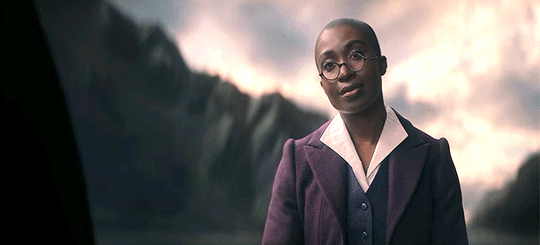
In The Sandman Netflix adaptation Lucienne is a stand out character and second only to Morpheus in importance, screen time, and centrality to the story. Lucienne is Morpheus's loyal Librarian, second in command, ruler of the Dreaming in his absence, and often times a voice of reason and advice for our dutiful King of Dreams. She is so well respected in her position that the other castle residents consider her their boss and would rather go to her for guidance and command than Morpheus himself. She takes care of Dream's ravens and even appears to have the power to create new ravens from newly deceased mortals like she did with Matthew. She is clearly extremely close to Morpheus, and is one of very few people he seems to actually listen to and trust. Lucienne's role in this story can not be underestimated.
So it may come as a surprise to any fans of the show who haven't read the comics to learn that Lucien (as he is called in the comics) is afforded very few of the above traits. In fact Lucien is no where near as close to Morpheus even by the very end of the story, as Lucienne is at the beginning. It is this difference that has fascinated me since I first started diving into the comics after falling in love with the show, and its something I view as extremely important when considering how the story is being adapted into a kinder, more sympathetic universe surrounding our central protagonist.
Lucienne's role is expanded greatly from her comic counterpart, and her relationship with Morpheus is shown to be much deeper. This is evident practically right away at the end of episode one when Lucienne comes to greet Morpheus upon his return to the Dreaming following his escape.
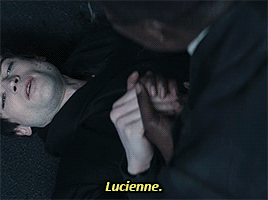
The way she runs over to him as soon as she realises he is back, and lovingly takes his hand and is so pleased to see him is a far cry from the comic where the first thing Lucien does is bow.
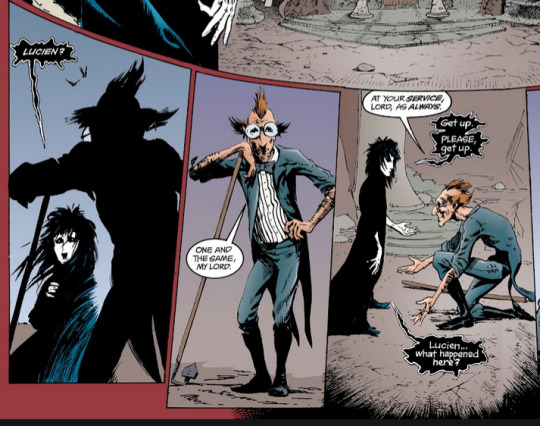
So right at the start we see a very different form of relationship here. Where Lucienne is already displaying a level of care and devotion beyond the expectations of a servant, Lucien however, is exactly that.
The servant thing has caused a bit of contention among fandom in the past. I think the confusion could come from whether or not you see Lucien or Lucienne first. Lucien IS a servant of Dream. Lucienne is more like a vice president and royal advisor. Those are two very different things after all and that difference only becomes more obvious the further you go into the story.
Lucienne accompanies Morpheus throughout his return to his crumbling kingdom, helps him as he attempt to repair the damage, follows him to Cain and Abel, and watches over his meeting with the Fates. She is by his side from the moment he returns until the moment he leaves again for the waking world to begin his quest to recover his tools, and she is responsible for Matthew's reincarnation as the new Raven and instructs Matthew to stay with him because of her concern for Morpheus's wellbeing on his quest.
I cannot stress enough how much none of this is in the comics. Lucienne shows a level of care towards Morpheus that just isn't present in Lucien in the comics. After the first meeting with Lucien at the gates of the Dreaming, Lucien doesn't appear again until he is instructed by Morpheus to conduct the census of the Dreaming. He only appears again in the Doll's House very briefly and has no involvement in Morpheus's decisions during that arc, which takes place very rarely in the Dreaming.
That's not to say that Lucien isn't a very trusted servant of Morpheus. He is the closest to Morpheus of all the residents of the Dreaming except only Matthew. But I think a lot of what we see in the show of Morpheus and Lucienne's dynamic is inspired by much later in the comics. I also think that it speaks loudly to the change in Morpheus as a character. Show!Morpheus has people almost right away who care about him and want to help him, whereas comic!Morpheus is extremely isolated. It is clear in the early comic stories that comic!Morpheus keeps himself at arms length from basically everyone. He does not have a bond with Lucien, he did not have Jessamy, and at that early stage, he didn't even have Matthew. All of this of course was primarily to make show!Morpheus a more sympathetic and likeable character - you gotta give your protagonist people who care about them, it helps raise the stakes after all.
Taking Charge - Lucienne is the real boss
One of my favourite parts of the Dolls House episodes in the Netflix show is the conflict between Morpheus and Lucienne due to the other residence and Dreaming servants going to her for advice and instruction first rather than Morpheus. Bearing in mind this only takes place less than a year after Morpheus's return from imprisonment, it speaks volumes as to how Lucienne has taken the role of leader of the Dreaming in her stride.
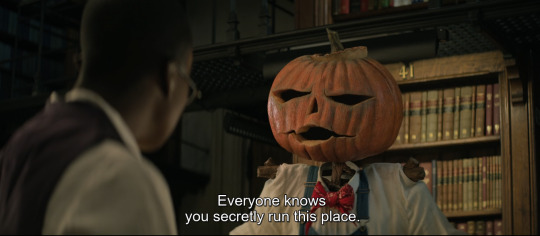
But it also indicates how Morpheus' change in the show is coming at lightening fast speed compared to the comic. In the comic, Mervyn doesn't make these observations until the Brief Lives arc, and this is indicated at that point to be a very new thing - triggered by several years post fish bowl of having to face his past decisions and mistakes (and a string of scorned ex lovers one after the other ending in a horribly matched rebound relationship with a murderous witch that subsequently rejected him and triggered him literally seeking out destruction). Lucien was only put in charge of the Dreaming when Morpheus left to go on his trip with Delirium. It is during that trip that Morpheus realises how competent Lucien is and capable of running things without problem in his absence.
Mervyn's insights are made clear here:
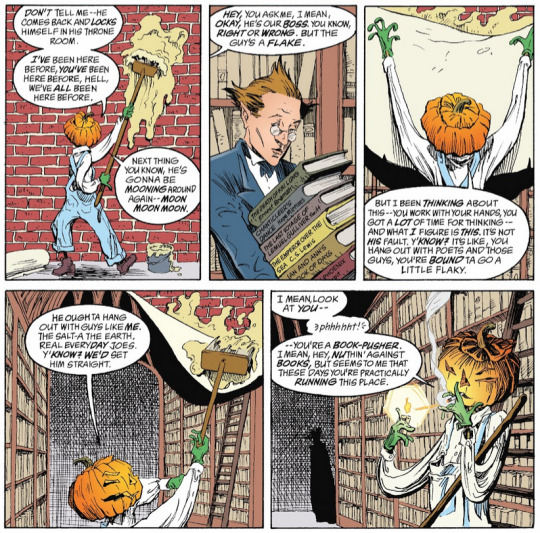
This is the only time in the comic that anyone dares mention that someone other than Morpheus might be the boss - and it is in no way as directly spelled out as it is in the show. "You're practically running the place" and "you secretly run this place" are quite different statements. The first only makes an observation about Morpheus's current lack of interest (in Brief Lives) in actually running his realm. It implies that Lucien is doing Morpheus' job for him, but does not go as far as to outright call Lucien the boss. Whereas in the show, that's exactly what Mervyn does.
In the comic, Morpheus overhears Mervyn's speech and immediately points out his reasoning for leaving Lucien in charge, for promoting him and giving him more authority.
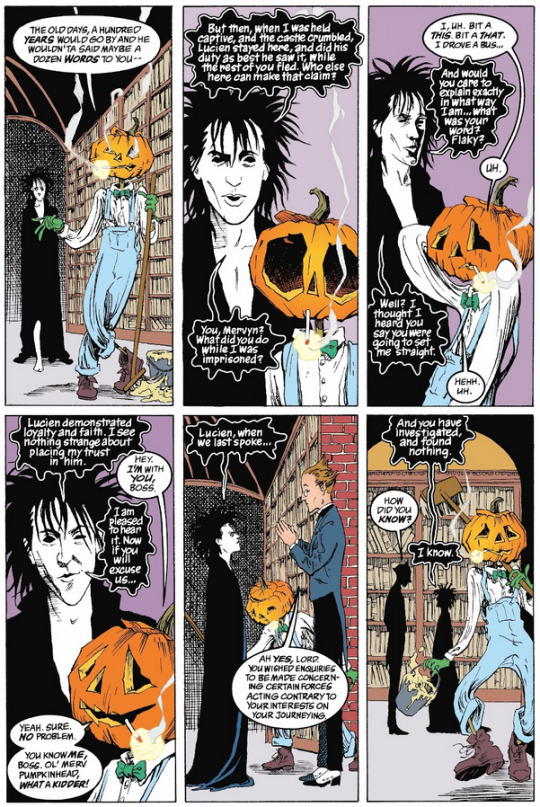
Because no one ever technically undermines Morpheus in the comic, there is no conflict here. Morpheus trusts Lucien as his loyal servant and gives him the power to rule in his stead (but only when he is absent) and there is no "secretly report to Lucien first" attitude among Matthew and Mervyn. We can perhaps interpret that this might be happening behind the scenes by this point in Brief Lives, or even just before the BL arc when Morpheus was distracted by his rebound murderess, but it is never actually directly stated that this is going on.
The tension between Morpheus and Lucienne in the show is born out of the conflict over Lucienne's position and Morpheus feeling undermined by his subjects, and its storytelling gold. But the only reason such a story works in the show is because Lucienne is so important to Morpheus in the show, because their relationship goes so much deeper than the relationship in the comic. Lucienne is not a servant, she's his god damn vice president and she knows it, and he knows it too. Throughout episodes 7 and 8 specifically he reaches out to her for her opinion and advice on the Vortex situation. He talks things through with her and seeks out her guidance. It is clear that he relies on her and it is only at the end of episode 8 when Lucienne disagrees with his punishment of Gault, that in his anger, he dismisses her.
Lucien/ne the Royal Advisor
Where Morpheus in the show seeks out Lucienne's advice and opinion frequently especially during the Doll's House arc, I have to stress that this never happens in the comic. Comic!Morpheus just does not have that kind of relationship with Lucien and does not seek his counsel at all, even though Lucien does try to give it on occassion, usually when Morpheus is about to do something extremely stupid and probably damaging to himself and the Dreaming. To name a couple times:
Season of Mists - before Morpheus returns to Hell:
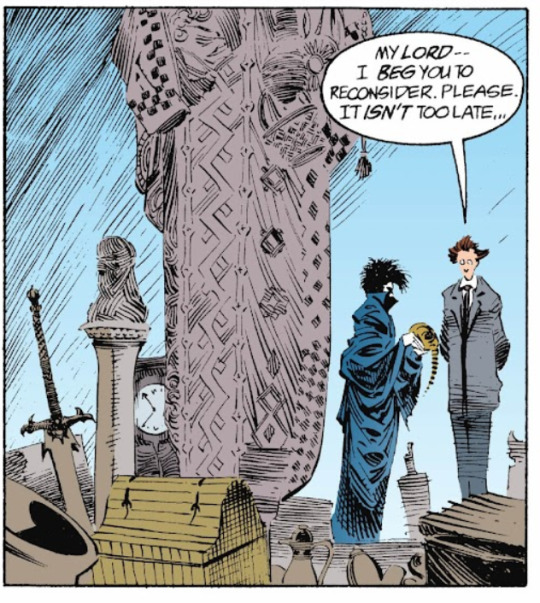
Brief Lives - before seeking Destruction:
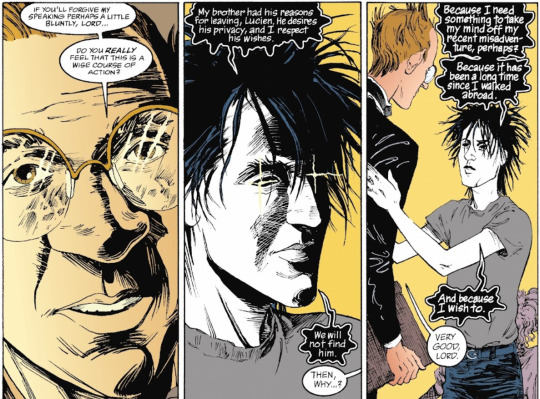
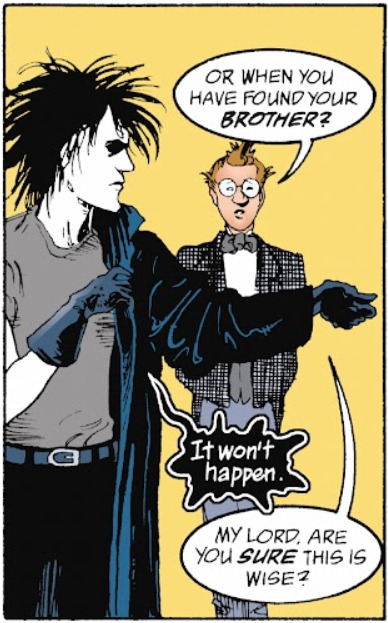
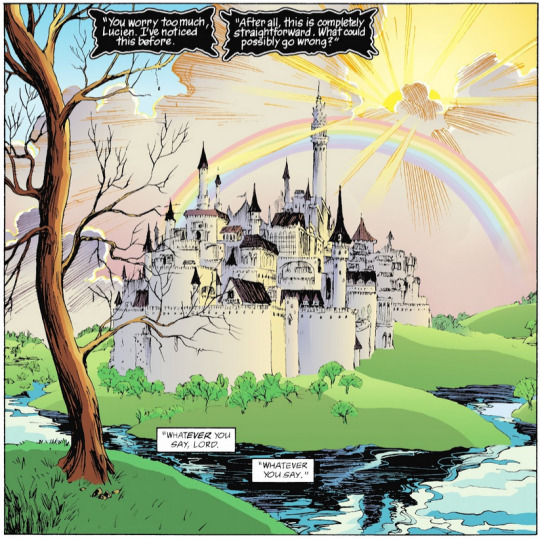
You'll note that in both these times Lucien's words of caution are completely ignored.
You'll also notice that in both times Lucien is taking a path of polite caution. Lucien very rarely speaks his mind to Morpheus, because he knows it won't get him very far to do so. The only time Lucien truly loses his cool and speaks freely is in The Kindly Ones (spoiler alert)
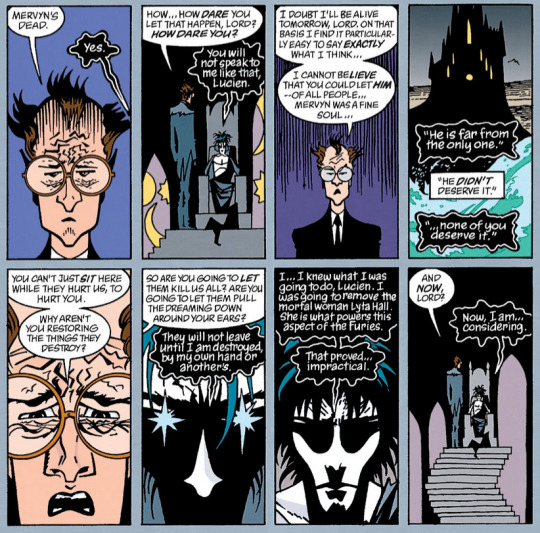
At this point in the comic story Morpheus has basically all but given up and accepted his fate and its fucking depressing AF. Lucien is well within his right to shake the bastard HARD and snap him TF out of it. I STILL think he was too restrained here tbh!
My point here is that Lucienne already speaks her mind quite freely around Morpheus in the show. She expresses her opinions and thoughts and gives him her advice. This is such a well established dynamic by the point of the argument that it is clear that Lucienne is offended by Morpheus's dismissal of her.
Take this exchange from episode 9:
Lucienne: "Rose is weakening the walls between realms"
Matthew: "You gonna tell the Boss?"
Lucienne: "No."
Matthew: "No?"
Lucienne: "It's none of my business."
Matthew: "Er, since WHEN?"
Lucienne: "Since Lord Morpheus reminded me that I'm merely a librarian and should concern myself with my books from now on."
Matthew: "He said that?! What's wrong with him!"
Lucienne: "Nothing is wrong with him. He's always been this way. He's just been away so long I'd forgotten. He's determined to deal with the vortex and the missing Arcana by himself. Without anyones help. So any news must be reported directly and exclusively to him."
It's worth pointing out here that whilst this is framed as Morpheus being a stubborn idiot, in the comic, he does in fact deal with the vortex and the missing Arcana by himself mostly and is not so much helped but saved at the last moment by Unity Kinkaid who realises what is happening in a dream and goes to save Rose, which also saves Morpheus from Desire's trap.
In the show, Morpheus has people who care enough about him and his realm to want to get involved and help him, not out of a desire to undermine him, but simply because they care about him. That is a drastic change from the comic at this point. Morpheus in the comic is constantly shown to be struggling under the burden of his own responsibilities and this is highlighted by the fact that he doesn't really get any support or assistance, and is far too prideful to ask for it. Lucien gets the promotion and chance to rule in his absence, but it is never framed as a job he shares with Morpheus - at no point does Lucien take the burden of his responsibilities off of him. This is no Samwise Gamgee "I can carry you" moment unfortunately. Lucien does not have the power nor the bond with Morpheus to undertake such a task because Morpheus keeps him at arms length throughout the comics - but Lucienne? Well, time will tell how that may change.
An Apology from the King
In a shock horror twist that comic!Morpheus would sooner die than do himself (ha) the great emo King of the Netflix universe gives Lucienne an apology for his behaviour (sort of).
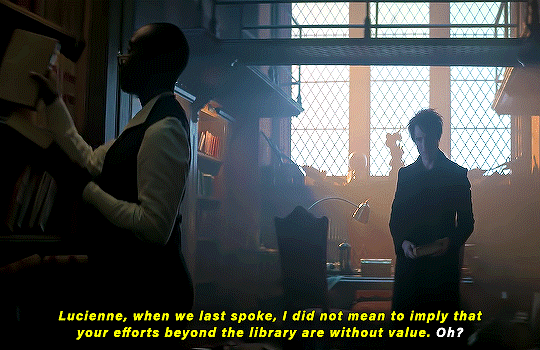
Episode 9 displays the tension between Morpheus and Lucienne following their "break up" perfectly. Morpheus is clearly in the wrong, and Lucienne is clearly hurt by his dismissal of her support. Yet even after the fight, he still seeks out her advice in determining the cause of the disturbances in the Dreaming. He goes to her first before investigating himself (something that comic!Morpheus wouldn't even consider doing) and is surprisingly capable in swallowing his pride here even though it is clearly a struggle for him.
Later in the episode, once he realises that Lucienne was right about the disturbances, he seeks her out to tell her so, and to confirm that she was right and he was wrong. This is again something that I can't fathom comic!Morpheus doing, even nearer the end of the story I don't believe he does so, certainly not to Lucien. Fiddlers Green drums this point home when he says this:
Fiddlers Green: "... still his time there appears to have changed him as it has changed me."
Lucienne: "How so?"
Fiddlers Green: "Lucienne, he came to you and told you he was wrong. It was very nearly an apology. The Morpheus I knew was incapable of that."
This further reinforces not just how much Morpheus has changed in a short time, but also how much he respects and cares about Lucienne and their continued relationship.
Platonic Life Partners? Co Ruler and Closest Confident of the Dream King
When I set out to write this meta, it was with the aim to highlight Lucienne's elevated role from her comic counterpart. To try to stress the importance of her character in the show and what this means for the future of the story in the show. By the end of the last episode, Lucienne is practically granted co-ruler status of the Dreaming while Morpheus works on his creations. He asks her if she can "take care of things while he works" which she agrees "with pleasure".
I just... I can NOT stress ENOUGH how much comic!Morpheus needed this person in his life. Even though Lucien looks after the Dreaming whilst Morpheus is away in Season of Mists and Brief Lives, it is always as a last resort with Morpheus continuing to check in on Lucien during Brief Lives as if he expects trouble, and he always seems a bit confused when Lucien tells him all is fine. As if he can't quite understand how the Dreaming could be okay without him there (and I mean, after the trauma of watching your realm which is also technically a part of you crumble to dust I suppose you would be a bit attached to it!).
Comic!Morpheus constantly struggles under the weight of his responsibility. His entire thing is that he is desperate to step away and not be who he is but he simply does not have it in him to do that. He is far too bound by his rules and responsibilities. For Morpheus in the show to be given someone to support him in his rule as King and assist him with the burden of his responsibilities is actually a hugely mindblowing change to the comic, and could honestly have huge repercussions on the story going forward. Not only that, but the Morpheus in the comics is painfully lonely. He desperately needs companionship but he keeps everyone at arms length. He never allows his subjects to get too close to him, even Lucien. Even Matthew isn't afforded the same level of closeness in the comics as he is in the show. In the comics, the ONLY character who Morpheus is close to is Death. Which says a lot by itself. The second character he gets closer to as time goes on is Delirium. Which also says a lot. Think of the characters in terms of their concepts. Morpheus has no close friends in the comics (even his relationship with Hob Gadling in the comic doesn't have half the impact it does in the show) and keeps all those he interacts with at arms length except for Delirium and Death.
But show!Morpheus? He has a Matthew who is already so very devoted to him, a Hob Gadling who waited an extra 33 years on hope alone that he would return to him, and a Lucienne who rules by his side, offers him support, guidance, counsel, companionship and probably a good helping of love. How can this Morpheus possibly carry the same deep loneliness as his comic counterpart? How can this Morpheus be buckling under the weight of his duties when he already has his Samwise Gamgee right there by his side? It poses an interesting question for how the show will handle future story arcs, though it could all prove to simply make for a much more painful story, where we happen to have many more characters to react and show the deeply painful grief that we all feel at his eventual passing - or maybe, just maybe, this is a universe where Hope never died...
#the sandman#dream of the endless#lucienne the librarian#lucien the librarian#sandman meta#sandman analysis#sandman comic spoilers#sandman speculation#dreaming librarian day#lucienne the sandman#this got away from me a bit#and it is 1am and I am posting it#even though it prob needs an edit#but i set out to post today and i damn well will#well its still today in america anyway#I hope you all enjoy this#now i plan to go visit the dreaming#goodnight and sweet dreams zzzzzzz
73 notes
·
View notes
Note
In defense of my pov and maybe I wasn't very clear in the ask... I do think the point of Itachi in the earlier arcs is that he is meant to come across as one dimensional (of course to writers and those who read a lot this actually should equal something potentially being incredibly fishy), so when we get the conspiracy reveal after his death I mean that I wasn't surprised there was more to it and I love how it threw every interpretation of his actions from beginning to end into a new light. (And I realize I forgot to fix a sentence and I love Itachi now, but when I first encountered naruto in my early teens, he honestly didn't scare me that much 😅, he comes into town, doesn't kill any of the main characters because that point in the story wouldn't have made sense for such a thing, and then he leaves, seemingly on a tactically considered whim which fits his characterization at that time)
I also think it's actually incredibly important that Orochimaru and Itachi are both meddling in Sasuke's lives at the same time, which is why I brought them up as a "comparison" even though their motives are never even remotely the same! Orochimaru is horrific as an individual and a villain, but from a narrative standpoint serves as an incredibly effective smokescreen. Orochimaru is an immediate threat from the moment he is introduced, he's a constant and threatening presence and Sasuke goes and exposes himself to that for years which leaves him very little time to introspect on the circumstances around his family's death.
Itachi on the other hand is more of a goal than a threat. He's dangerous, we see enough of him vs other cast members like Jiraiya and Kakashi for that, and he very badly wants Sasuke to pursue him (seen as early as the hotsprings town attack and later made abundantly clear to be because he wants Sasuke to spend his vengeance on him, although even that reasoning is multi layered). He's one of Sasuke's primary enemies, but he functions so differently from Orochimaru that the audience just sees him as a different kind of big bad is all.
(Sorry for the long explanation, I just don't want you to think I'm stupid 😅 but I also might be coming at my interpretations from a different place than you and that's fine too! I appreciate your first answer regardless and thank you for those panels! The manga is so long that I definitely forget things.)
For the purposes of my own work, I often think of how information is compartmentalized in the village... because other members of the konoha 11 also come to the conclusion Sasuke should be killed, but the tactical ones have different justifications than Sakura if I'm remembering correctly? I think they're mostly meant to parrot the village policies, esp since they're secondary characters at best, just cementing the way that villages sacrifice individual members for the sake of less war (which is different than real peace!), but it still makes for some interesting considerations of how much/what other characters know and where they get their information from.
Anyways, sorry again for the long ask but thank you for so much uchiha content!
Oh, of course. Initially, he is meant to be a one dimensional villain, and there are hints dropped to give him more nuance, which make sense after the truth reveal. When we move towards the chapters/episodes leading to his death, the story starts to explore his fragility while he's still a villain.
His reveal didn't surprise me. It devastated me. I've been one of those who had some gist of him not being evil, but the tragedy was entirely unexpected.
If you love Itachi too, then welcome to our hell because we suffer forever here, loving both the brothers.
Don't worry, I loved reading your interpretation of both Itachi and Orochimaru and their influence on Sasuke. Itachi is a big deal because even though Sasuke faces an actual threat from Orochimaru, he isn't scared of him. But whenever he sees Itachi, his reactions are always intense. And even after their battle, he was completely shaking, even if he knew Itachi would have exhausted his chakra too. The only person Sasuke was really scared of was probably Itachi. Other than Itachi being invincible, there were a lot of feelings. Itachi had been cruel to him. Not only physically or psychologically but also emotionally. The only one who could dismantle him was Itachi. And Sasuke had all the unanswered questions in his mind because from his POV, his beloved brother one day stopped loving him when he'd always been so supportive of him.
I think other Konoha Shinobi wanting to kill Sasuke is different from her wanting to kill Sasuke. They didn't love him, they didn't care about him, and that also includes Kakashi. She claimed to love him, and concluded that he needed to die for his own sake. I have no expectations from Konoha 11 and I don't care about their opinions on Sasuke either. But she married Sasuke and never bothered to know why he changed so suddenly and why he would want his brother back. Does she even know anything about the Uchiha clan and its history? And what happened with Itachi and all? Probably not.
Don't worry about the long ask. It's totally fine. Thank you. :)
#itachi#sasuke#uchiha brothers#anti sakura#anti sakura haruno#anti ss#anti sasusaku#i'm writing so much sakura slander nowadays it's crazy#ask
17 notes
·
View notes
Text
There is a level of deep, bitterly poetic and cruel irony in Astarion's death and his eventual fate as a vampire spawn. Laughable, even. Lamentable.
Where do I even begin. I once posted here my thoughts on who Astarion was before Cazador took him; and all my thoughts were based on what we can assume to be canon from scraps on information in - game and interviews with Neil. That Astarion Ancunin who was laid into the ground at Baldur's Gate cementary was a corrupt magistrate, a shining example of power abuse, indulgence, hedony, existence in privilege without any service to the world around.
We also know for a fact that Astarion is not a good person in a moral sense. Again, Neil Newbon himself talked about it. He has capability to grow, mature, open himself up, soak in the positive influence and feel for others, but he never will be the default upstanding type. That is simply not at his core.
This is why (I am aware we're talking a fictional character, headcanon is free to all in whichever way they think it suits and pleases them) I cannot for the world believe in all the fanfiction based on the notion of the tragic, tortured soul unjustly attacked and turned into a vampire, because to me - it misses the entire depth and essence of Astarion's personality and arc. He was not a "worthy" persona before Cazador; in fact, the beating he got from the Gur was well - deserved and the near - death experience... Probably so as well. Maybe if anything, this would open his eyes and force him to reflect at least a bit on his choices in the position he was occupying. (But given that he mentions begging Cazador to turn him to be able to take revenge, I highly doubt that.) So yeah... The man got what was coming to him. He deserved it.
But what he got in the end once Cazador allowed him to drink his blood and had him in his hold? Two hundred years of misery and abuse beyond description, being completely stripped of any identity and personhood? No one deserves that. Such fate should not be thrust upon anyone. Ever.
It is the cruellest, most wicked twist of fate that it took that kind of ordeal to change a corrupt little elf's view of the world and force him to even acknowledge the existence of evil deeds and abuse of power - something I am quite sure he never gave any thought to before. It took being transformed into an utterly helpless victim to make him truly see that there is good and bad and perpetuating the bad leads to pain and misery for the innocents (and you can never be sure if not for you as well), and only then, at his most pathetic, most vulnerable, after centuries of torment, it took meeting, trusting, admiring, being grateful to, befriending / loving and being influenced by a genuinely good and kind person (probably the exact opposite of who he was before) to shake and cause some shift in his inner moral compass, or rather the way he was choosing to use it. The full circle, a poignant, unwilling journey from the one abusing power, to the enslaved puppet of someone with considerably more power abusing it in the most inhuman ways possible, and this time to his own woe, to the one person able to break the abusive cycle given the right influence.
Isn't that simply poetic in the most sickly sense? A tragicomedy, if you will.
Forget about Astarion Ancunin. The grave was good for lovemaking and sharing an important moment, but whoever was laid there was not anyone worthy of your time (just like "Ascended Astarion" )The one who stands by your side now is. Your Astarion. The new Astarion, the same "lovable rogue" with a taste for theatrics, drama, debauchery, beauty, murder mayhem and loose morality, but - a better person all the same.
[follow up post here
https://www.tumblr.com/glitteryinknotes/733162725841289216/a-little-follow-up-to-my-previous-post?source=share]
#astarion#baldur's gate astarion#baldur's gate 3#baldur's gate 3 astarion#baldurs gate astarion#bg3 astarion#astarion bg3#bg3#baldurs gate 3#astarion analysis#astarion ancunin
1K notes
·
View notes
Note
have you seen the commentary from the p5r artbook going around? the shuake part of my dash is losing it a bit at the implication that their wishes were mutual!!! that seems to be what some people are getting from the commentary at least… amy insights?

Hi! I have been through the artbook. It's great, isn't it? :D
The image above is called "One Ending", and the creator caption (by illustrator Akane Kabayashi) reads:
When I think about how Akechi's wish was to play chess after school with the protagonist, I almost want to call him out with "You liked him after all, didn't you!"
Look at that. We're told about Akechi's wish, and what it included. We're as good as told outright that he likes Joker—and this isn't the only time, there's also this:


—There are a whole lot of things we can imagine, based on how the protagonist was depicted as someone special to Akechi.
Those are more or less the exact emotions represented during Akechi's confidant. (Mumon Usuda, chief designer)
"someone special" here is 特別な存在 tokubetsuna sonzai—literally "a special presence". It means a special person, and more than that; it describes someone you find compelling, someone you can't look away from, someone who becomes one of your most important people, the centre of your world. It's another term that is often romantic, but isn't necessarily romantic.
(In the same way, I think Kabayashi's suki jan! is more tongue-in-cheek than it is a cast-iron confirmation that Akechi was canonly in love with Joker. The language there is teasing, it's ambiguous, it's baity; Kabayashi is joking. This is a rank 6—as they say, if you know, you know. But it is of course ultimately up to all of you.)
There's another mention of this image, down in the creator interview:

Out of all the Maruki ending illustrations, it was Akechi's that stuck with me the most. It made such an impression to see them opening up as friends, having a fun, peaceful time together like high school students should. (Mumon Usuda, chief designer)
What really strikes me in all of this is the emphasis the creators put on the fact that this is Akechi's illustration, Akechi's wish. Because I've thought for a while that we know Akechi has a wish. You can see him struggling with his refusals to Maruki in the first week of January. And you can hear his wish spoken—when Maruki repeats it back to him, during the boss fight, on 2/3:
Maruki
{F1 81}君たちとなら、君も過ちのない道を歩めるかも知れないじゃないか!
{F1 81}-kun-tachi to nara, kimi mo ayamachi no nai michi o ayumeru kamoshirenai ja nai ka!
If you're with {F1 81}―kun and his friends, you could begin to atone for what you've done!
Think about it! With [Amamiya]-kun and his friends beside you, you could choose a path with no mistakes as well!
So this wish has several parts. First, there's that kimi mo, "you also"; it's tempting to read this as Maruki also wanting his new world to erase his past mistakes. Second, there's the first part, "if you're with [Amamiya]-kun and his friends". Where to even start here?
Being with Joker and the others is a prerequisite for the second half of Akechi's wish. It doesn't just coexist, it enables the rest of it. Just like his words in the engine room, "I wonder why we couldn't have met a few years earlier, [Ren]..."
Remember, Akechi's whole arc is about his rejection of trust and friendship, and his insistence on doing everything himself. This is precisely what Futaba calls him out on—"you trusted no one", or "you played life in single-player mode". This is what he unlearns at the climax of the engine room, when he realises he isn't prepared to let the others die—and follows through to save them.
Akechi is nothing without others, and he knows it. Without their support, which he believes he has no right to, he has no hope of living a better life, even were he to be given the chance—and he knows that, too. He has learned, and he has grown—and yet he knows the things he needs and wants so badly are forever inaccessible.
And his wish is about all the Phantom Thieves, not just Joker. There are many tiny references to this end—not least the original Japanese rank 10 line for his confidant, where he sacrifices himself for all of you. Joker is his compelling presence, his someone special, but he's formed small bonds with the others too, God help him.
and then there's the crime thing
The localisation frames Akechi's wish in terms of atonement, but that's not what's on offer. You cannot, after all, atone for things you never did. We see Akechi's wish put into practice, in the Maruki ending, where he appears with his friends beside him, wholly innocent and with unstained hands. And we see it in the first week of January, after he has finally met Maruki and spoken to him:

Akechi: Ah, that reminds me—there was one more thing I wanted to tell you.
Akechi: About the reality Maruki's put us in...
Akechi: It seems that Okumura and Wakaba are both considered alive by all accounts.
[Ren: They're not dead anymore? / What do you mean?]
Akechi: They aren't mere illusions, or cognitive beings—they truly are alive and existing in this world.
Akechi: In fact, their deaths seem to have never taken place at all in this reality.
[Ren: What happened to Shido?]
Akechi: Shido was the only one arrested on the crime of attempting to overthrow the government...
Akechi: It seems the Phantom Thieves were causing a stir in this society as well, but there's no record of your arrest now.
Akechi: Basically, in this reality, you and I haven't committed any crimes.
While Akechi still remembers his crimes, they never took place. They have been undone, and only his lingering memory—and Joker's, at this point—speaks to them. He objects to this on countless levels, he summons all the strength he has to refuse it, but don't make the mistake of thinking that means he doesn't want it. This is Akechi's wish in action.
People are often very certain that Akechi's resolve in the third semester is like iron—that he rejects Maruki's offers right away, is never tempted, never wavers. But that can't be true. We know he's afraid to die. We know about the bad end where you don't complete the Palace, where Akechi says nothing and stares at the floor, seemingly blaming himself internally while all the others blame themselves aloud, for being unable to say no to Maruki's temptations. We know how he responds to this assertion of Maruki's—Maruki, who has perfectly summed up what we know all the other PTs wanted, and who (even if Word of God hadn't just confirmed Akechi's wish) we have, honestly, no reason to doubt.
Because Akechi never refutes this wish that Maruki describes. He never says he doesn't want it. He just rejects it—like all the others, who so desperately want what Maruki could give them. Futaba's mother, Haru's father. Akechi's life, and his innocence. And the people who might have been his friends, if he could dare, one day, to ask.
Akechi is tested just like the others, and the price he pays for his defiance is perhaps the highest of all.
and finally
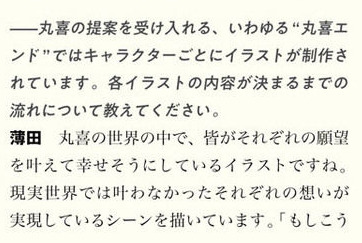
[The Maruki ending illustrations are] of Maruki's world, where everyone's wishes are granted and they seem happy. The scene shows their actualised wishes, which were never granted in the real world. (Mumon Usuda, chief designer)
We shouldn't forget the price Akechi pays for his impossible wish. Sure, the vision of himself being altered like Sumire clearly haunts him, and I'm sure it made the choice easier—but I don't think it made it that easy. Instead of taking the dream Maruki offered him, Akechi chose to face up to what he'd done, and who he'd become; at the very end, in the third semester and in the engine room, he always makes the right choice.
And that choice was taken away from him. Agency over his life and death, his own acts, and who he would even be—Joker and Maruki take it all away from him and make him a puppet, just like Shido.
Maruki's ending isn't pretty.
revision history
Click here for the latest version.
v1.0 (2024/03/29)—first published.
#asks#persona 5#p5 meta#things i translate#japanese language#word of god#shuake#goro akechi#takuto maruki
521 notes
·
View notes
Text
I keep thinking about what slotting the Job sequence in between the Flood and the Crucifixion does for Crowley’s arc, and his relationship to both Aziraphale and heaven.
@amuseoffyre did a great analysis of the importance to Aziraphale's arc here that sparked this thought, but it sent me down a rabbithole because A+C are both having very different experiences here.
Compare how Crowley bounces up to Aziraphale at the flood vs how standoffish he is when the angel shows up to the Job situation. Aziraphale is the one who's all friendly, "Oh it's you!" while Crowley... is pretty businesslike, at least until he gets the chance to start rubbing the reality of the situation in the angel's face.
The flood pissed Crowley off. Job is the first time we start to see the more bitter Crowley we'll get to know. In the Garden he was bemused about overreactions and almost having fun poking this angel with questions about God's plans. Beginning of the flood sequence he was pretty playful. This whole earth thing hasn't been so bad so far, and oh here's that weird angel again, that's fun.
But then he gets hit with God turning on their creation without warning, again. And the flood was at least in God's name ("That's more the type of thing you'd expect my lot to do," he said. Wasn't heaven supposed to be the good guys?). But now with Job? God turns their back and just... doesn't stop hell. Heaven's hands stay clean while hell dirties their evil little claws. Oh, so this is how things are, Crowley realizes. This is the part he's meant to play. Fine.
And seeing how he acts here... I can't help but feel like he'd mostly given up on Aziraphale after the flood. After Crowley went, "Wtf, this is clearly an atrocity," and Aziraphale stuck to "You can't judge the Almighty!" ...well. Giving away the flaming sword was probably a fluke. Just another tool of heaven, that one. Disappointing, but what should he have expected?
So all through their Job interaction he plays up his demonicness, trying to force Aziraphale to toe the party line and prove Crowley's new view on things right, once and for all. But there is a crack there, because not-so deep down Crowley would love for Aziraphale to surprise him again.
(After all... he is lonely. Try some wine with me, or have an ox rib, angel.)
(Fascinated by the difference in Crowley's gleeful "That's just how it started for me, see you in hell" vs. "I'm not taking you to hell, Angel. I don't think you'd like it." And only admitting to the loneliness once he isn't totally alone anymore; I think the original lie was more to himself than anything. He's angry, he's bitter, these righteous angels shouldn't think they're any better than him, not when they can doubt too. But when it comes down to it? No, I don't actually want to drag you all the way there. Something about guns and miraculous escapes, and his comment about Wee Morag, it's different when it's someone you know, isn't it. Hm. Anyways.)
By the end of the Job situation they have a moment where they confirm they are more similar than they thought. But it's not a happy thing. It won't be until Rome when they start enjoying each other's company just for the sake of it. So at the crucifixion Crowley comes up to Aziraphale still prodding at him. You happy about this, Angel? You smirking over how righteous it is? But now instead of, "You can't judge the Almighty," we get "I'm not consulted on policy decisions." Implying he disagrees without really saying it. And that's enough for now, Crowley will take it.
From the flood -> Job -> crucifixion -> Rome, we see Crowley get angry, then more and more resigned and bitter. Until Aziraphale reaches out and pulls him out of it.
#i like how the Job sequence both shakes things up and doesn't at the same time#it's not totally necessary to make the arc work but the context helps you understand so much more#good omens#good omens meta#good omens 2#good omens spoilers#crowley#v watches good omens#job flashback
2K notes
·
View notes
Text
I think an underrated aspect of Separation Arc and why it works so well is that once Mob finally stands up for himself and stops going to work, we think we can expect the following to happen:
Reigen quickly flounders at work but stubbornly denies he's incapable without Mob's help
Reigen eventually runs into a client who truly needs the help of psychic powers (e.g. the client is haunted by an evil spirit who cannot be exorcised with salt)
Reigen realizes that he truly needs Mob to not be seen as a fraud and that he shouldn't have taken him for granted
Reigen seeks out Mob and apologizes, Mob accepts his apology and agrees to work for him again
Except... that's not what happens. Reigen does get upset and lonely without Mob, but his business runs fine—in fact, Reigen's own ambition and smart thinking actually allow him to find greater success as a psychic. The only reason Reigen's public downfall even happens is because he was maliciously tricked by Jodo, he'd figured out on his own that the kid wasn't possessed! This and the fact that Jodo is seeking petty revenge for Reigen "humiliating" him (when Reigen actually saved his life no less) really makes us feel like Reigen's public mockery is unfair and unjustified... even though we've always known from the beginning that Reigen is a fraud.
Isn't that a strange turn of events?
Then we get to the press conference. It's possible that even if Mob hadn't helped him at the end, Reigen could've still managed to salvage some of his public image. He was calmly answering people's questions and answering truthfully, pointing out that they had no evidence he was a fraud and that no one had ever had an issue with his work before the show. But all of that stops mattering to Reigen when he realizes that despite all his efforts from childhood, he's still just a lonely, lonely man who has never had any idea what he wants to do in life. The only reason he kept running his psychic business in the first place was because Mob showed up in his dull life and brightened it up with his vivid color.
It is finally here, after all this time we've been spending with Reigen, that we both figure out the truth: Reigen needs Mob not because of his powers, but because Mob is his friend and inspires him to be better. And this full understanding of Reigen's complex character and deep connection with Mob is what hits all of us so hard in this episode, it's so painfully human and real and we would not have gotten all of this had the story just played out as expected.
Thus culminates the genius subversions of Separation Arc: despite having the world's attention all focused on him, Reigen only makes one honest apology to one boy. This boy might not even watching this at all—if he is, he's probably watching this with spiteful bitterness—but it's still important that this boy knows...
You've grown up so much. You know that?
991 notes
·
View notes
Text
Subtext and Culture, Young Royals, Season 3, Episode 3
Episode 3 picks up the day after the camping trip, and Wilhelm calls his mom to check on her. She dumps a massive guilt trip on him, maybe unintentionally, and Wilhelm is feeling a little bit down.
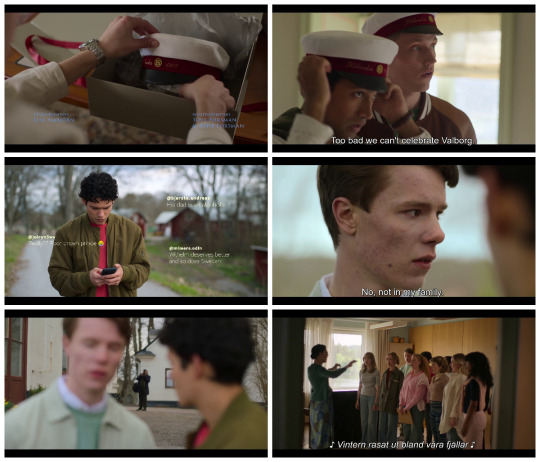
Culture: These are Swedish studentmössor. They originated in the 1800's among Nordic university students and they wore them as a common marker. Later, they were adopted as graduation caps for high school students, signifying that they were now allowed to begin studying at a university.
Culture: Valborg, April 30th, is a traditional Swedish holiday where you celebrate the coming of spring with bonfires. It is also the start of graduation season for high school students, and graduates are allowed to start wearing their caps.
Cinematography: This season they started writing most on-screen social media commentary in English, despite those users being pretty obviously Swedish. I suspect it's because it saves them having to subtitle all of them, it makes it a bit easier for all the viewers to follow along.
Subtext: No, keeping up appearances is more important than mental health for the royal family, which is why this is new behaviour that Wilhelm has never seen before.
Subtext: As a reminder of the increased interest, here's a paparazzi intruding on school grounds. Also, where the hell is Malin? Isn't it her job to shoo away photographers?
Culture: Vintern Rasat is a classic Swedish song celebrating spring that's often performed by student singers at Valborg.
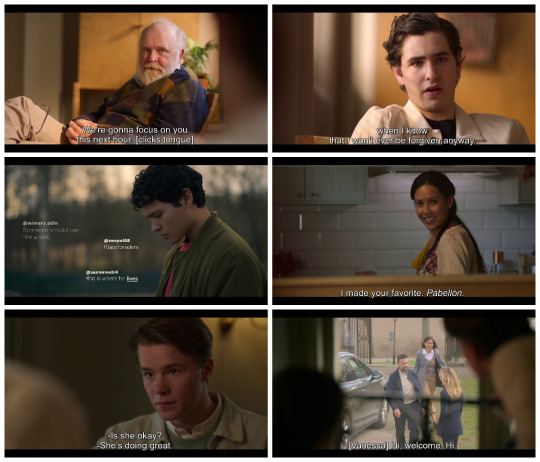
Subtext: Boris cleverly offers August individual therapy, something he sorely needs.
Subtext: It's of course a bit ironic that pretty much the entire fandom hates August and has decided that he can't be forgiven or redeemed. Yes, you, dear reader. But Boris lays out a way for August to start his redemption arc. Will it work? Tune in for next week's episode!
Culture: These usernames reek of white supremacy. Norse mythology references are very popular, and 88 means H*il H*tler, so that's the kind of people we're dealing with. The show is also foreshadowing what's gonna happen at the end of the episode.
Blink and you miss it: Linda made Pabellón, a Venezuelan dish. In season 1 we didn't know where Linda was from, but in season 2 she was canonically made as being from Venezuela, just like Omar is in real life.
Subtext: I think August actually cares, Kristina is family to him too, but Wilhelm refuses to treat him as family, so he lies about how she's doing. Not very convincingly, though.
Cinematography: This is an absolutely hilarious shot with a bunch of students anxiously peering out through the windows as the dreaded enemy arrives: Skolinspektionen! Dun-dun-dun!
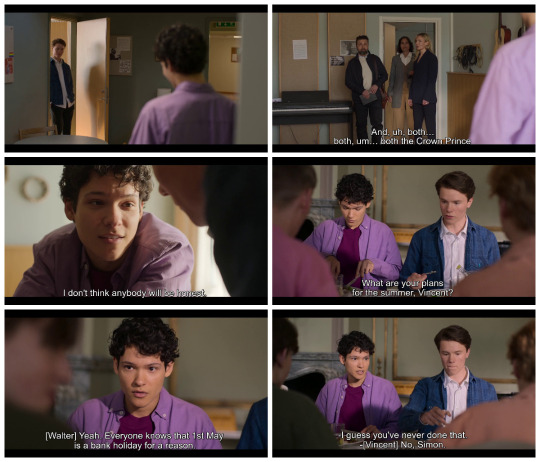
Blink and you miss it: There's a rainbow flag on the board to the left.
Subtext: Vanessa totally knew she interrupted a makeout session between our boys. Oh, and there's a lot of purple in these two scenes, colour theory exploded with joy.
Subtext: Simon will be proven wrong, someone will be honest.
Subtext: It's also ironic that Simon joins the rest of the Forest Ridge boys pretending to have a great meal together that is totally not stiff and awkward at all, absolutely not.
Lost in translation: Simon Walter says that May 1st is a "röd dag" - a red day, which is how Sundays and public holidays are usually marked in a Swedish calendar. "Bank holiday" is the term used in the UK for public holidays. There are 13 public holidays in Sweden each year.
Culture: Första Maj is the name of the International Workers' Day in Sweden, because it always occurs on May 1st. In defence of Henry and Walter's shared braincell, most Swedes actually don't participate, but it's a bit weird to not even know what it is.
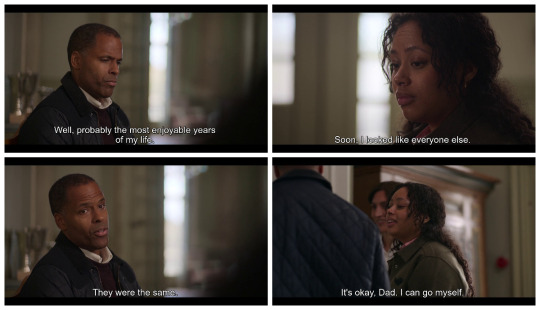
Subtext: This entire sequence shows how Felice's dad tried to stick up for himself, but quickly learned to keep his head down instead and conform and roll with it. And it wasn't just the other students who were racists, the staff was in on it too. This goes for all the shit the students are doing, the partying, the booze, the alcohol, the bullying: The staff is in on it. They know. They're complicit.
And despite all of this, Poppe's immediate answer when asked how his time at Hillerska was, is that it was the best time of his life. This is why schools like this stay the way they are, why they never change, because they're very good and very bad at the same time. Trauma-bonding works, the kids will all get friends for life, they'll forget the shit and remember the good times. They'll become like him.
But when Felice learns what the school did to her dad, she decides to help shut it down, to stop the cycle of abuse. The reason she goes in alone is because she now knows she can't trust her dad, he's gonna defend the school, and she also doesn't want him to know that she snitched.
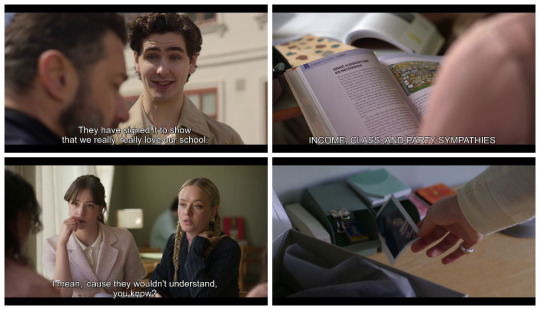
Subtext: In official surveys, students from schools like this generally rate them very highly. Student satisfaction is very high. Maybe they're lying, maybe they're delusional, but they sure care more about their schools than public school students.
Blink and you miss it: REAL SUBTLE THERE, SHOW.
Subtext: Keeping with the school theme, this is how students defend the shit that goes on. Outsiders are kept in the dark, you don't tell them anything, because they "wouldn't understand", they're missing the "full context", etc. Oh, I don't know shit about fashion, but Fredrika's jacket smells very expensive.
Blink and you miss it: While Wilhelm pinned a polaroid of himself and Simon prominently on his wall, August keeps a similar polaroid of himself and Sara hidden.
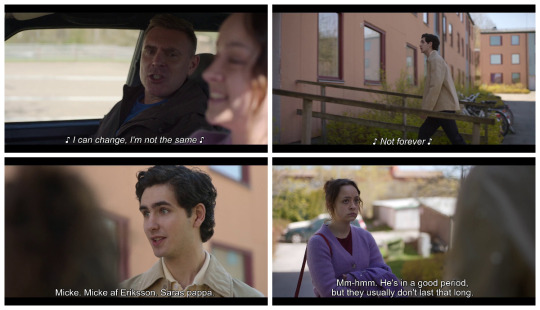
Subtext: Micke's redemption arc is in full swing, so why not play a song that reinforces the idea that people can change?
Subtext: August's redemption arc is in full swing, so let's cut to him nervously waiting outside Micke's place for Sara to come home, while the same song is playing. Is he gonna be a villain forever?
Blink and you miss it: Micke introduces himself as Micke af Eriksson when August introduces himself as August Horn af Årnäs. The English subtitles for some weird reason went with "Micke Eriksson of Bjärstad", but that's actually not what he says.
Subtext: Sara is pretty realistic about her expectations of her dad because she's seen this before, but this also applies to her expectations of August, because she knows that he can also slide back into his normal shitty self. Also, she's wearing a purple sweater.
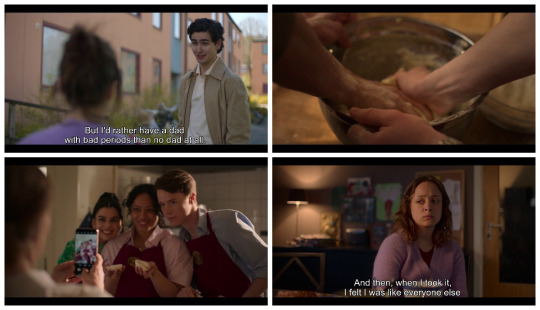
Subtext: In case you forgot, August's dad also struggled with addiction, and died from it, so he and Sara actually has that in common. Maybe there's hope for this redemption arc thing?
Cinematography: I don't fucking know why they included this baking scene. It serves no purpose, and I suspect quite a few people in the production have a serious hand fetish, because what is this? What is this? Also, why are Simon and Wilhelm joining what appears to be a Manor House thing with the rest of the girls? How? Why? This makes no sense! It's very cute, though!
Subtext: Oh ok, we got a social media pic that Sara could see and feel bad for her lost friendships. But man, those Hillerska aprons! On point!
Subtext: This is unfortunately a very common thing for people on any kind of psychoactive medication. How can you tell if you need medication if you feel good right now? Is it lasting or temporary? Can you trust your own brain? Either way, fantastic conversation between Micke and Sara, which starts her on her journey to reconcile with Felice at least.
🎵 I can change, I'm not the same, not forever. 🎵
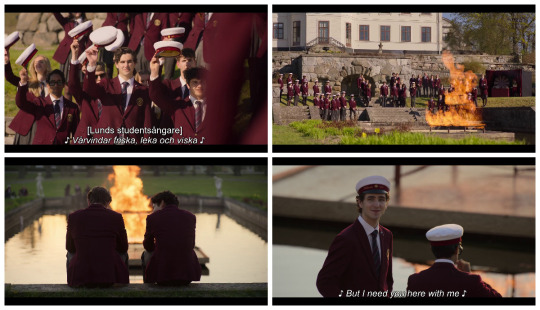
Culture: The official hat-on-putting ceremony where all the third-year students put on their hats, set to another traditional Swedish spring celebration song: Vårvindar Friska.
Culture: It's Valborg, so Hillerska has their own little bonfire. We saw some students with torches pretending to light it, but it's actually floating in the middle of the fountain so, uh, how did they do that? Normally, your local bonfire or Majbrasa is just a huge heap of wood that you set on fire.
Cinematography: Man, this is a pretty show. Look at that shot. The fire, the sunset, the pool reflection. The end of April is over a month after the spring equinox, so the days are getting longer, and the sun now sets at about half past nine in the evenings.
Subtext: Ok, let's do one more on-the-nose lyrics thing for when August sees Sara back at school. Yes, yes, he needs her.
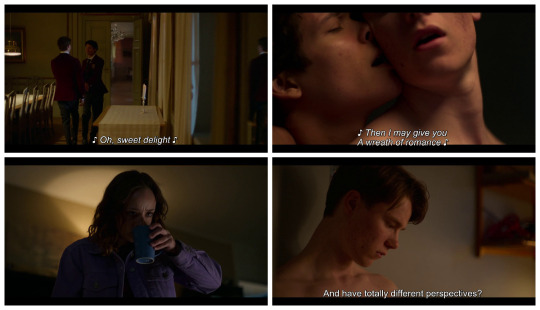
Culture: I had to post about it immediately after watching the episode, because setting a sex scene to Uti Vår Hage is hilarious. Everyone in Sweden knows it, most people have sung it at school, it's a cute little song about enjoying your garden, flowers, and giving your loved one a wreath of flowers. I can now never hear this song without thinking about this scene. Thanks a lot, show.
Blink and you miss it: Simon fucks Wilhelm. Yay! Versatile supremacy!
Subtext: Sara is still so suspicious of her dad's behaviour, she can't make herself trust that his current good period will last.
Subtext: Even though this dialogue is about how Simon and Sara are so different, it of course also applies to how Wilhelm and Erik were different, because Wilhelm struggles with not being able to handle his duty the same way Erik could.
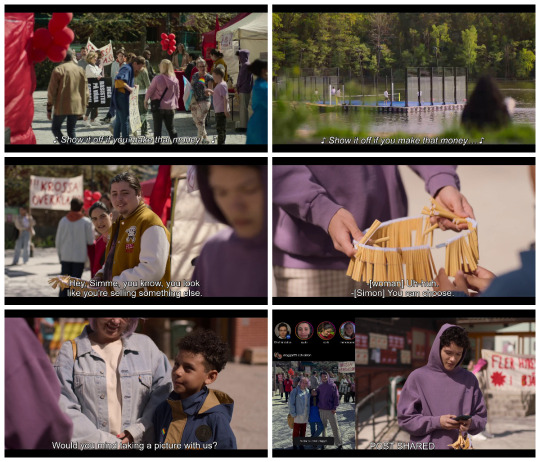
Culture: Alright, it's time for the actual local Första Maj event in Bjärstad. The town is probably a bit small to have a proper demonstration parade, but there's people with banners and socialist slogans, and a bunch of local organisations have joined in, including Bjärstad BK, the football club Rosh plays in.
Culture: Meanwhile, the absolutely not socialist rich kids at Hillerska are nursing their hangovers and enjoying the day off, and they're doing some yoga and playing some padel instead. As you do.
Subtext: Drugs. He looks like he's selling drugs.
Culture: These apparently confused a bunch of viewers, but they're just raffle tickets. It's one hundred numbered, rolled up, paper tickets stuck on a metal ring. When you buy a ticket you just tear it off at the perforation, and when all tickets are sold you can just break the seal on the ring and pour all the stubs in a bag or whatever so you can draw winners.
Blink and you miss it: Cute kiddo has a pride pin on his jacket.
Lost in translation: The show waited a bit with showing what it says on the banner behind them in the photo, but if you can read Swedish you immediately saw that it says KROSSA ÖVERKLASSEN - CRUSH THE UPPER CLASSES. Oh no, Simon, what have you done?
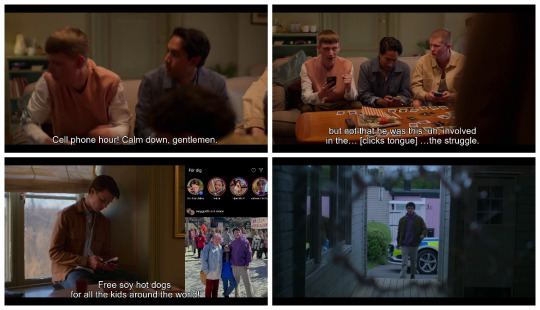
Blink and you miss it: Like a pack of rabid wolves, the social-media starved Gen Z kids rush to their phones for an hour of glorious feeding on Instagram and TikTok.
Blink and you miss it: I love Vincent so much, he's terrible, but he's just so much fun! The little fist he makes as he says "kampen" just seals it.
Subtext: The show still hasn't revealed the banner text to the non-Swedish audience, but Wilhelm immediately sees it and knows how bad it is and why Farima tried calling him seven times. Also, Vincent is just on a roll here.
Cinematography: Man, this is a pretty show. Look at that shot. Look at how they perfectly aligned the hole in the window with Simon, the police car, and the entrance to their house, as he discovers that someone decided to vandalize it.
224 notes
·
View notes
Text
The Agency's Older Brother: or, Ranpo's Character Development
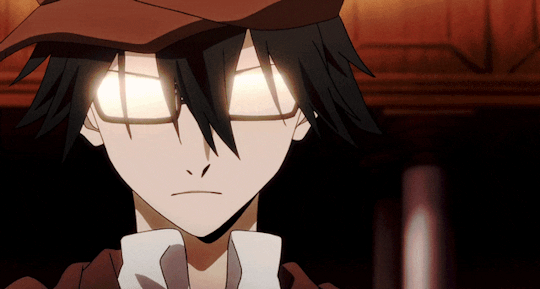
I want to talk about Ranpo and the development he goes through in the series, because for as much as Ranpo is an important member of the Agency, his story is focused on in small chunks that may not always, at first read, seem to be overly significant. In fact, Ranpo’s arc is very consistent and I’m fascinated to know where it’s building to, because he’s done a lot of growing in the series. A lot of the themes of his story are to do with responsibility and faith in others.
The Ranpo we meet at the beginning of the story is not the Ranpo we see now. The biggest change is that he’s a lot more personally involved with the struggles of the Agency members, taking it on himself to be proactive and protective, while previously he had to be pushed and bribed into helping much of the time. When did this change?
Well...


[ID: Two screenshots from a scene in Poe's introductory episode of the Bungou Stray Dogs anime. In the first screenshot, Yosano lies on the carpeted ground, an axe embedded in her chest, blood pooling around her. Ranpo is crouched beside her, supporting her shoulders with one hand and clasping her hand with the other. The second screenshot is a close up of Ranpo's distressed face. End ID.]
The thing is, it's almost easy to overlook the effect this scene had on Ranpo, because Poe’s introductory chapter/episode is such a brief one. Moreover, afterwards, Poe becomes an ally and is a bit of a silly character, so it’s easy to forget sometimes that he was a legitimate threat here - and Yosano nearly died for it. This scene was incredibly significant to Ranpo for a few notable reasons.
It’s the first time someone in the Agency was in serious trouble/died without a backup plan.
It is, unfortunately, kind of on him. (Let me be real clear here: I am not blaming Ranpo. But he probably was blaming himself and that's something to keep in mind.)
To recap: Poe pulls Ranpo into his novel out of revenge, also trapping Yosano, who went with him. Ranpo realizes that they are in a world with no abilities, and importantly, he doesn't have the glasses Fukuzawa gave him.
We know those glasses mean a lot to him. When Ranpo was at his lowest, when he was convinced the world hated him, Fukuzawa gave him those glasses and told him he had a special ability. That he had a gift that no one else did that allowed him to see the truth that no one else could. Untold Origins makes it very clear that if Fukuzawa hadn't reached out to Ranpo when he did, Ranpo may have forever been outcasted. He was a kid kept in a bubble then suddenly and rudely shoved into a world he was unprepared to cope with, where he continued to get rejected and thrown out over and over - and all this on top of the grief he felt from his parents' passing. Ranpo was bitter and terrified of people, and thought everyone was pretending to be oblivious just to hurt him. Fukuzawa saved him the only way he could, in the only way Ranpo would hear him. It's not an exaggeration to say Fukuzawa saved Ranpo's life. And, while cute, it's also telling how quickly those glasses became an intrinsic part of his identity. Only maybe twenty minutes after he first received them, he was already making little doodles of himself wearing them.
Suddenly, the glasses are gone, and Ranpo goes into a funk because he "can't activate his ability without them". Obviously, we know that isn't true, and so does Yosano. Ranpo probably, deep down, knows this too, but to admit that would be to admit the president lied to him, and to uproot the very thing that gave him the means to perceive the world in a brighter light. The reason Fukuzawa had to lie in the first place was because the truth would be to tell Ranpo that his parents lied to him, something he angrily denies could ever be the case. And now, Fukuzawa is very plainly stated to be Ranpo's adoptive father. Ranpo's parents do not lie to him. He does not want to see it - and so he doesn't. This is a recurring thing with Ranpo. For as much as he sees the truth clearly, he also chooses not to see it at times when it would be uncomfortable/go against the intuition of someone he deeply trusts and respects.
And I think it's very easy to just leave it there, and say, "Oh, Ranpo realized at the end of this chapter/episode that he didn't need the glasses, that he doesn't have an ability, and that's a key turning point" but I don't feel that's the full picture or even the focus here, especially since Ranpo still hasn't reached the point where he can properly admit it aloud, even to Yosano.
The thing is, those glasses aren't just of use to Ranpo - they have sentimental value. A heck of a lot of it, for a character who is not very sentimental. The real turning point here is that Ranpo put on Yosano's glasses in order to save her.

[ID: A screenshot of a panel from the Bungou Stray Dogs manga. Ranpo puts on a pair of glasses. His hair is blown out of his face and he wears an intense expression. End ID.]
Shortly before this, we are informed by Yosano that not only was the Agency specifically formed for Ranpo to make use of his talents, but also that it was Ranpo who invited her to join - which we later learn was a pivotal moment for her to start over after she was completely broken by her experiences in the war. And now, he is watching her bleed out because she had to take over. Because he couldn't solve it. And that, to Ranpo, is unacceptable.
But again, there's more to it. Ranpo is fundamentally a self-centered character - this is not a judgement; I actually love that about him. He's the center of the Agency, the (ostensibly) good guys of the series; a narcissistic guy with little in the way of sensitivity who wants to use his skills to help others. Not for some higher ideal, or because it's "right" necessarily, but because he's good at it, and because he's supposed to protect all the "babies" who can't solve things for themselves. I love it because it highlights a major theme of BSD, which is good as something you do rather than something you are, and also because it explains something about Ranpo himself.
See, if everyone in the world is a "baby" who needs Ranpo's assistance, then the people in the Agency are a little different. They're people hand-picked by Fukuzawa to support him, both through praise and through backup. Remember that Ranpo trusts Fukuzawa's judgement more than anything - this means that he expects the Agency members can handle themselves. So, in chapter 10, when Ranpo doesn't really care that Atsushi has been taken, citing that it's a "personal problem" and he should handle it, I really think this was some odd form of "Atsushi will be fine" and "why should I worry or do anything when I know he'll be fine". And in the past, this has been true - the Agency members always pull through. None of them, up until that point, have been in a situation that they couldn't eventually fix. Ranpo has a bubble of safety in the Agency, that basically amounts to a "villain of the week" type beat from his perspective, where troubles gets fixed up pretty quickly. All in a day's work.
But then Yosano dies in Poe's book, someone he actually had some level of responsibility for when he invited her to join his safe little circle in a world that had no place for people like them. And it's a direct result of Ranpo's refusal/inability to act.
In order to fix this, Ranpo uses Yosano's glasses. The lens he's seeing through has changed. The people in the Agency were initially "his" in that they were meant to support Ranpo, the special one "chosen" by Fukuzawa's glasses, the reason for the Agency's existence in the first place. But now the people in the Agency are "his" in that they are his to protect. He's their big brother they all look up to in a way, and as the big brother, he's got to take responsibility for their safety.
Why did this not stand out in the moment? Well, we learn something about Ranpo from Untold Origins: he's very good at pretending he's doing okay and things aren't bothering him as much as they are. He's able to hold it together up until it all comes spilling out of him during the play. Also, I do think Ranpo cares about people a good deal more than he'd have you believe. A common fanon thing about Ranpo (from what I've seen) is that he tends to forget people, which, I can see how one would come to that conclusion, but I actually think it's completely wrong. I don't think Ranpo's forgotten a single person he's accused. I don't think he's forgotten a single person he's helped.
He lied about not remembering Poe, in fact, he remembered him pretty fondly as a real challenge. He remembers the information on a person from the Special Division he was asked to look into and gave the info to Mushitarou to allow him an in. He recognizes an officer he'd helped, and it's implied he recognizes every single officer who had been present while he was working on cases in the past. Does this mean he cares about all of them? ...eh. Probably not. But it does mean that Ranpo keeps a lot of his cards close to his chest. He's disarming with his intentional childishness. And so it can be difficult for the characters and readers both to notice that events like Yosano's almost-death... actually bothered him a lot more than he let on.
Because it was his fault. Because she was his responsibility. Because he's supposed to be invincible.
And unfortunately, the story from here on out does not get any kinder to Ranpo as his safe bubble that is the Agency is repeatedly targeted in ways that are increasingly hard to repair.
Fukuzawa falls ill and nearly dies in Cannibalism arc.
A girl gets blown up and Kunikida ends up in jail because Fyodor managed to manipulate Ranpo's intel.
Mushitarou is believed to have been shot and killed trying to warn Ranpo about the Decay of Angels plan.
Taneda bleeds out from a stab wound and falls into a coma. Ranpo can do nothing but listen and cannot get him help.
The amount of times Ranpo has seen people nearly die in front of him... bro it's almost as bad as Kunikida.
Much like Kunikida having extreme faith in his lofty ideals which make him fall just that much harder when he fails to uphold them, Ranpo has practically zero self-doubt and complete and utter confidence in his abilities... so when problems arise, Ranpo is very harsh on himself. He takes the blame because he's supposed to be better than that. Because he is the one with the powerful "ability" that should never fail.
In this sense, Ranpo's position in the Agency reminds me a lot of a certain person in the Port Mafia, someone who also has a powerful skill he puts towards protecting his own, someone who also received life changing words from the boss which earned him his loyalty, and someone who would do anything to defend the only place in the world he feels secure.
I think there's definitely a reason Cannibalism arc had Ranpo and Chuuya face off, I'm just saying. Both of them ostracized and thrown out as young teens by people who should've been looking out for them. Both the instigators of that arc, proactive and desperate to protect the person they are most loyal to who changed their perspectives. They've even got the same power stance, look. :P
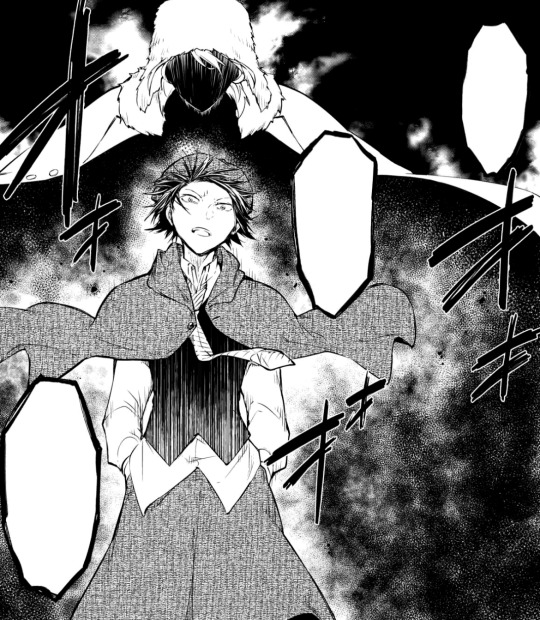
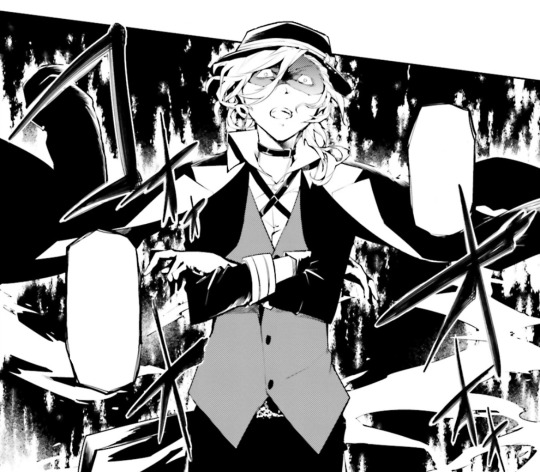
[ID: Two panels from the Bungou Stray Dogs manga. The first is a panel of Ranpo with the silhouette of Fyodor behind him. He is standing with his hands in his pockets, facing front with his head tilted back and to the left a little, a fierce expression on his face and his cloak billowing outwards. The second is a panel of Chuuya standing in a similar manner, arms crossed, facing front with a fierce expression as his coat billows out around him. End ID.]
Of course, there's more interesting comparisons and contrasts to be drawn between them, but I'm focusing on Ranpo in this analysis, so I think I've made my point. Chuuya is the Port Mafia's best martial artist. Ranpo is the Agency's strongest man. And that places a burden of responsibility on them that they both believe they must uphold. They're both ready and willing to do whatever it takes.
The thing is though, is that Ranpo doesn't actually have an ability. When up against someone like Chuuya, he is at a distinct disadvantage, and he knows it. "Regular people can't defeat ability users". But he's still going to come up with a way to do it anyways, and why?
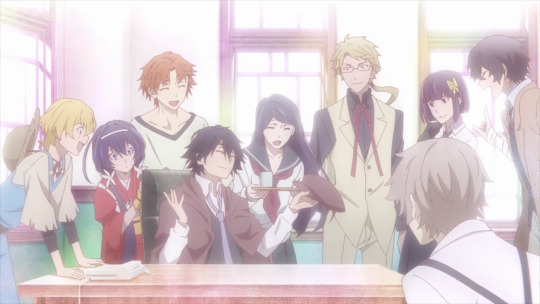
[ID: A screencap from the Bungou Stray Dogs anime. The members of the Agency all stand around Ranpo, who is seated at his desk with a smile, one hand holding his cap, the other held up in a casual gesture. The image is filtered in a soft light. End ID.]
Because his friends think he's invincible.
If Ranpo wants to maintain his safe place in a world of fear, then he has to step up to defend it, and he has to get creative about it. And that's exactly what he does. Ranpo becomes steadily more active throughout the story, which is a huge change from the start, where he had to be practically bribed to help at all. I see a lot of people point out his channeling of Fyodor's tactics to secure Kunikida's release, which is definitely a dark turn for his character, but it's not the only change.
Ranpo is now choosing to place his faith in others, the first obvious instance of this being his use of Poe's novels - which was how he defeated Chuuya. Ranpo knows that he is not going to succeed against people who drastically overpower him all alone, even if he does still take things on as personal burdens. He's also far more obvious about his protectiveness, going on the rescue himself to save the Agency members, driving a car (whereas before he needed someone to take transit with him - another indication of his increased proactivity since he's now literally driving instead of being driven), and bodily shoving Atsushi out of harm's way.
It all culminates in one of my favourite Ranpo scenes where he speaks at the conference to the police, who've worked with him before, where he asks if they will think for themselves - and tells everyone gathered there that anyone can be a detective if they think for themselves and look with their own eyes (!!!). He manages to get half the police force on his side, just through his words and his logic alone! Minoura assumes he somehow knew it would all work out, because, well, it's Ranpo. Ranpo knows everything.
But...

[ID: An image from the Bungou Stray Dogs manga. Ranpo sits in the passenger seat of a car with an honest, helpless smile. End ID.]
He reveals he didn't know if his ploy would work at all. He had to trust that it would with no solid proof. He had to trust these people would use their heads and look beyond the obvious. He respects these people enough that he thinks at least some of them will make the right call.
Fourteen year old Ranpo, bitter and estranged from other people, would never. For him to have come such a long way is testament to the security that the Agency provided him with. In a way, Fukuzawa forming the Agency allowed Ranpo to "complete" his childhood in relative safety, so that when the world became hostile once again and his family destabilized, Ranpo had matured enough to meet it and defend himself and those he has a responsibility towards head on. The Agency is his family, and Ranpo cares for them enough that he puts his faith, not just in them, but in the people they put their faith in too.

[ID: A panel from the Bungou Stray Dogs manga. Ranpo is kneeling in front of Fukuchi, who is sitting backwards on his chair to face him. End ID.]
...aaaaand then Fukuchi went and ruined it. Thanks, Fukuchi.
Ranpo again chooses to put his trust in someone without proof because Fukuzawa trusts him, only for that to have gotten thrown back into his face in the worst way possible. And it's in this regard, the trust aspect, that I think we'll see Ranpo develop as the story goes on.
Will he continue to show this tentative faith in people? Or will he begin to hyper-analyze, unwilling to trust again without proof?
If this arc gets resolved decently well, I think Ranpo will have no issue brushing this off as a one-time thing. However, if what I fear might happen does and Fukuzawa doesn't make it out of this arc... Ranpo will be destabilized.
I don't know that Ranpo would go "bad" per se. He likes the other Agency members. He cares about them - that's genuine. But if Fukuzawa dies, then Ranpo may begin to take darker actions in order to keep them safe, almost overprotective and harshly logical, with little room for blind trust or risks in the name of justice or honour. It may put him at odds with Kunikida, in that Ranpo may start to develop a strong "do what's necessary" mentality, even if that may be immoral. He may regress a little into his old trust issues.
However, I really don't think Ranpo will go too far down the path of darkness, even if the worst should happen. He's a lot tougher than he seems, and he has a good support system in the Agency. I guess it remains to be seen where Ranpo's story takes him next.
Until then...

[ID: A screencap from the Bungo Stray Dogs anime. Ranpo sits in his chair in a cuter art style, having taken a bite from the pastry he has in his left hand. End ID.]
I love one good boy. :)
#ranpo's such a good character man. there's so much i couldn't cover here but he's so so good.#but anyways. ahahahahaaaa i finished it! yesssss#sorry for the. VERY. long delay on this#i'm back baby#bsd#bsd ranpo#bsd meta#call me ace detective the way i am ace. and also a detective.#storyrambles#hope i got everything. whee.
941 notes
·
View notes
Note
My God I love your depiction of the Wittebane brother ❤️
Do you think there might have been a chance that your Pip wouldn't kill his brother when Calec goes to Demon Realm? He seems way more tolerable of weirdness and is actually curious about the taboo things. That it makes me wonder if other steps were taken by people around him, maybe he would make different choices and not turned into a brother-killing genocide goop man. Obviously, the blame is still his for what he did, but I can't stop wondering what if.
And him getting along with Evelyn instead of hating her right of the bat is really cute.
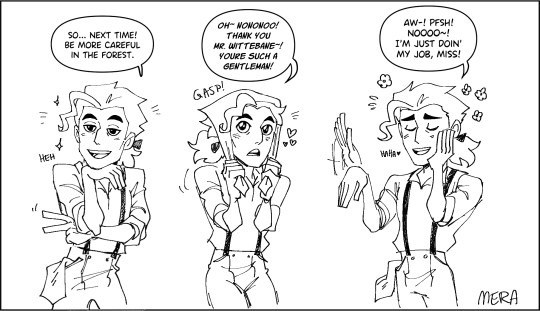
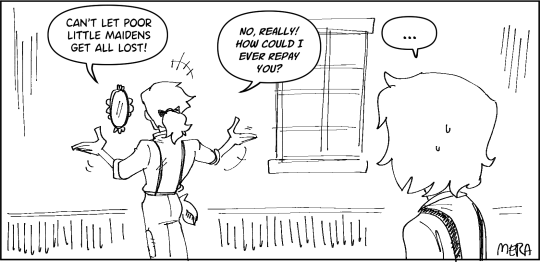
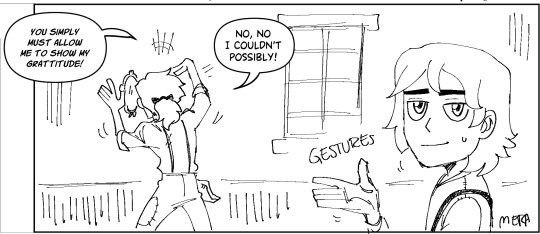
Thank you! :D <333
He grew up with this theatrical bisexual of a brother. Pretty sure the reason Belos didn't give a hoot on the Boiling Isles about queer stuff is because he kinda knew, and accepted, that Caleb was kinda queer. In some cases, people can ignore or bend certain rules for people they love. Even disregard them or pretend they don't apply or exist.
(long rant about writing and narrative foils and blah blah under the cut)
Unlike Caleb, I think Philip is the sort that only picks-and-chooses whatever rules he feels will supports his personal wants/thoughts and tosses the rest.
Caleb was not hiding it as well as he thought he did. lol.
I think that, sure, there was probably a turning point for Philip.
And absolutely, people around him influenced him. He's just a kid, a vulnerable one at that, in a protestant Christian cult.
I kinda like to think of it as a corruption arc. Mostly because it seems (to me) that the whole reason Luz was meant to have a depression-arc and Philip getting all "YoUrE JuSt LiKe Me!" thing was because.. There was supposed, I think, to be similar beginnings for them.
But Luz, in season 3, got depressed and felt a lot of guilt, so her arc is going from this happy-go-lucky kid interested in different things, to a depression arc where she questions herself. While Philip has a corruption arc, where he gradually goes from a well-meaning kid interested in different things, to evil and delusional.
I am also combining Luz, King, and the Collector into Kid-Philip's themes.
King is fascinating as a pre-narrative foil for kid-Philip. I think. As King was very clingy to Luz and didn't want her to leave, he too had a delusion about his own importance (disregard that it was kinda true in the end there). King tried to dictate (in that book episode) about what his and Luz' book should be about, how it should go, and it really hurt Luz' feelings. In the end, they solved it. But as a narrative foil, I think for the Wittebanes, they probably had a similar struggle on a larger scale, and it didn't get resolved.
The Collector, too! They're desperate to be close with someone, anyone, who gets them and wants to play on their terms. Kinda like Belos wanting him and Caleb to be witch hunters. Not accounting that Caleb is his own person outside of him-- Which, if you think about it, Caleb made his whole life (in my version anyway) about taking care of Philip. So I'm sure Philip felt like he really was Caleb's entire world. And then suddenly he wasn't. Because of a witch.
The Collector, despite having this incredible power (just like Pip having his brilliant brain) is still a child and using their power in selfish ways. Not intentionally, I think, just out of a fear of abandonment or isolation.
I personally am in favour of nobody-is-born-evil-but-anyone-can-become-evil kinda thing.
I would like to explore how Philip gets corrupted.
I am slowly influencing Philip in my fanfic with little things that will, eventually, boil down to not so great moments.
The thing about delusions is that the person truly believes in it. Philip believing he's a hero has to make sense and feel believable.
Belos is a jerk. Philip isn't, yet. He becomes that jerk. But I don't want to write a sociopath. I also don't like using less-favourable mental illnesses as an "easy way out" to write why Philip became Belos and a genocidal maniac.
I have strong feelings about de-stigmatizing mental illnesses in writing, without romanticizing them or leaving out the really awful and less discussed sides of it. This includes diagnoses within all the clusters of the DSM5. I will not sit here and say I only support a diagnosis like Autism or GAD, and not things like Histrionic or Borderline.
And including people with MH issues and personality disorders is important, too, as well as not trying to downplay them.
People throw around Belos with things like Narcissism and Psychopath, without actually understanding what those means or what the different types there are. For example, is he a grandiose, oblivious or a fragile narcissist?
Yes, these disorders are looked down upon. A lot of people who have them aren't very nice people. But that doesn't mean they're evil or have no heart.
Lots of children can display early signs of these, and in a rough time like the colonial 1630s of America, it is not unthinkable that those rough times bred some dysfunctional people. I'm sure Philip has his own slices of pie as far as mental health goes, just like Caleb and many other struggling people.
But, I will not write from an angle that implies Philip just has darkness from the start in him.
There's a reason why I had Caleb go on a rant about being born evil in chapter 5. Because puritans, and Christians alike, at the time - truly did believe bastards were just... Half people. Did you know that if an orphanage found out a baby was a bastard, they wouldn't let it suckle the nursery goat's udders. Because they were afraid it would soil the milk and, in turn, might give the non-bastard babies bad influence. Somehow.
With that kind of logic in your culture, it's no rocket science that people would put nonsense together and think it made sense.
I'm much more interested in how puritanism and witch hunting culture influenced and corrupted Philip into becoming who he became, and why he refuses to budge on his beliefs to the point of murder.
As the owl house, the show, has commentary on systems influencing cultures in a bad and positive way. But in particular, the one Belos tries to influence the Demon Realm with; being a not-so-great way. So! With that as a clue: what made Philip turn bad, most likely, was partially the puritanism and its extremist ways.
I think TOH is also a bit of a nudge at the HAYS-code of Hollywood and how it has trickled into most all the American culture-core. As it's both trickled into schools, morality, politics and other things outside cinema.
Just pointing at him and going "He's a sociopath because he became a genocidal tyrant" is, to me, cheap. Not only does it further stigmatising mental illnesses by implying only a disorder can make someone do such evil things. But it also disregards the most horrific truth of all; that the true monsters are people not at all unlike yourself. And that they, too, were children once.
#ttocw#caleb wittebane#philip wittebane#toh#the wittebane brothers#the owl house#toh fanartthe owl house fanart#toh comic#wittebros#wittebane#toh caleb#toh philip
356 notes
·
View notes
Text
One of the reasons I will never be at ease with the overall "weirdness", the underwhelming pay-offs and the unfired Chekhov's guns during the plot(s) of season 2 - until season 3 arrives and we either learn that it's because of a brilliant trick they pulled on us OR because Neil & John actually did drop the ball and couldn't get the story structure right (yeah, sure 😏) - one of those reasons is that they got Aziraphale's character arc during that season so very, very right.
It is beautiful. It is subtle. It is organic. It is like a red thread running through all the episodes.
In the very first scene we learn something about Aziraphale & Crowley that we didn't know before. And it isn't that Crowley used to be such a ray of sunshine and that what led to the Fall must have been more traumatising than he always let on (that, too, but it's not the main point). It is that Aziraphale knew a version of Crowley that was deeply, unapologetically kind, and gentle, and caring; that he was everything an angel was supposed to be; and that Aziraphale himself, before the Fall even happened, was aware of some lurking inequity and oppression which presented a danger to that sweet, innocent angel. We are shown how Aziraphale could arrive at the conclusion that whatever happened to Crowley just wasn't right. And how he might think that that was something that should be fixed.
"I know the angel you were." In Job we are reminded that Aziraphale's memory of Crowley's angel persona at least that early in their story still partly informs his image of him.
"They aren't talking to him anymore", that sounds as if Aziraphale might have actually tried.
"It's nice to tell someone about the good things you've done, now that I'm not reporting to Heaven..." Aziraphale misses it. He still does good deeds, but he misses reporting them to someone.
"You really used to be awful." Gabriel is about the worst angel he has known. But once Heaven's conditioning was taken away, even he became an absolut sweetheart. Aziraphale learned this season very impressively that angels can change.
Muriel. Innocent, enthusiastic, downright good Muriel. Whose adventures as a human copper are mirrored so perfectly in Aziraphale's attempt to pass as a "newspaper man". Aziraphale learned that even now, not ALL angels are bad. And that there are some in Heaven who are just like him, and might need his help.
When Gabriel needed his help, Aziraphale gave it, with no vindictive thought or concern for his own safety. He couldn't just not help him. And when Crowley stormed off, Aziraphale simply waited for him to come back. This mirrors both their decisions at the end of season 2, though so far without Crowley changing his mind and coming back.
It has all been layed out for us from the beginning. Which is why it baffles me so much that so many people did not seem to see it - or want to see it.
Now, Crowley's character arc!
I am not really sure about that, but so far, to me, it seems to be just as all over the place as the plot setups and his sideburns, hair length, hair colour and sunglasses during the season are.
We are shown that present-day-Crowley keeps important things from Aziraphale - he still hasn't told him about Gabriel's attitude during the attempted execution, he hasn't told him that he is living in his car, and even when Aziraphale tells him that he needs to go to Heaven, he doesn't tell him about the looming second attempt at an apocalypse - which is extremely weird, since it would have been so important for Aziraphale to know and could have influenced his final decision quite a lot. At this moment the latest you also can't explain it as an attempt to protect Aziraphale anymore, since going in blind could make things actually more dangerous for him.
He did not do this during season 1, where it was Aziraphale who kept things from him for quite a while.
But after all this aggravated not-telling-him-things all he needs is a conversation with Nina & Maggie and immediately afterwards he makes the biggest, most honest confession of his life? Really?
And then all these comments casually dropped about his former rank as angel - "How do you know I didn't do it?" / "That's not actually a thing, that's just something we used to joke about to frighten the Cherubs" / "They never change their passwords" - and all these hints about his memory - he knows how it feels to "look at where the furniture isn't", he doesn't remember or claims not to remember either Furfur or Saraquael - something just doesn't add up. It actually is like looking at where the furniture isn't.
I do want to believe that when I figure it out that I will know a lot more about what's coming in season 3. Alas, I don't think I can figure it out without knowing what is coming in season 3.
#aziraphale#crowley#final fifteen#the final fifteen#ineffable divorce#good omens aziraphale#good omens crowley#good omens#good omens 2#good omens season 2#good omens s2#good omens meta#good omens analysis#aziracrow#ineffable idiots#ineffable husbands#ineffable dumbasses#az fell#anthony j crowley#aj crowley#ineffable spouses#ineffable partners#good omens show#good omens tv show#crowley & aziraphale#aziraphale & crowley#nikku's posts#nikku.txt
255 notes
·
View notes
Text
The thing that really gets me about Separation Arc is how utterly mundane it is. One exorcism at the beginning, a call Reigen shouldn't have made leading into all those words he shouldn't have said, and then nothing until the cameras at the press conference start floating like some kind of miracle.
Which makes sense, of course. The arc follows Reigen instead of Mob and he doesn't have powers so there aren't powers. But there's more to it than that. It's a deliberate choice; it would have been easy to show that Reigen needs Mob for practical reasons, for him to come up against an actual spirit and end up scared or hurt because he couldn't exorcise it on his own. But the show doesn't do this. His business is fine. He's savvy enough to stick to jobs that he can actually do, and he gets enough of them that he's busy (and contrary to the fanfictions, truly dangerous jobs are a rarity to begin with). Practically, Reigen is doing perfectly fine. It's the mundanity that breaks him.
I've made a million posts about how Mob Psycho being a story about connection means it's also a story about loneliness, and I don't ever feel that more deeply than I do here. When there's a metaphor or a layer of fantasy obscuring things, no matter how awful they get, it feels safer. You don't actually have to worry about an evil ghost trapping you in a nightmare dimension. You don't actually have to worry about a giant vegetable brainwashing all your friends. The emotional impact hits, and it hits hard, but there's a layer of distance to it.
But there's no distance to Separation Arc. There's just the awful crushing inescapable everyday loneliness, the kind that it's so easy to fall into. The feeling of being in your late twenties, at the point of your life where you've finally had a few years of making your own decisions--and feeling like every decision you've made with that agency has been wrong. The feeling of having drifted away from the friends you used to have and not knowing how to make new ones. The feeling of getting emails from your parents and not answering them because you don't have anything to say that wouldn't make them even more disappointed and worried. The feeling that you've thrown away anything good or important in your life and not knowing how to fix it. That you're stuck. And not having anything or anyone else to blame. Only yourself. It's all so real and so overwhelming.
And the arc shows you all of this, unvarnished and unblinking, and then says It's okay. It can still get better. This isn't the end. No matter how lonely you've been, no matter what you've done, you can find people who will love you. You can make better choices. And no one has to stick around if you've pushed them away, no one has to forgive you if you've hurt them. But maybe they'll choose to anyway, and it will feel like a miracle.
#mp100#mob meta#hello i was also extremely lonely in my late 20s so now i have to cry about Reigen Arataka forever. sorry.
564 notes
·
View notes
Text
Long Ramble about CCCC and my overall feelings on what the album means and such
Something I find important about CCCC is like.
The fact that all three of them are, in some way, trying.
Heart is emotion, he is prone to himself and being reactionary, in the moment. Prone to the past of learned behavior and trauma. Reactive and rapidly changing. He isn't going to make pure sense because he isn't based in logic or in societal ideals or views. He is an instinctual response to the environment and circumstances. His manipulation is not intentional. He has very little control of himself in the end. Its why Mind talks about claiming to relish entropy yet clearly needing help. But, Heart in earnest wants them to be okay and safe. He believes that Mind's control will drain the life from them. It will make things monotonous and the same. Too much order.
Mind in turn, believes Heart is manipulative with intention. He wants to control Soul or wants to just drag them all down with him into this depressive state. Mind is logic, he is the reasoning out of your emotional instinct. Your inner critique, and when unchecked, that inner critique goes from a guiding hand for your emotion to one that debates and bullies it. Invalidating its responses. Ultimately, though. Mind just believes he is helping. He is doing what must be done and telling the "hard truths" to Heart. And that Heart is being the petty child. Which- I mean. Sort of sure. But Mind is definitely fucking petty and childish. He's stubborn! Prideful! So ofc he is. Admitting you're wrong? No.. why would he EVER do that.. nuh uh.
Which is what makes Light so crucial. Mind asking Heart for help- but also. There is Soul.
Who while ambiguous in purpose, is mostly that background voice. Your inner narration. If Mind is Logic and Reason then Heart is Emotion and Instinct,, Soul is all that lives between it. And he is constantly silenced or spoken over or around. He does not get a word in edgewise until TSE. He may show up in the background occasionally but as much as Heart and Mind claim to want to keep him alive and help him, they also fail to actually acknowledge what he says.
Which is that they both are right and wrong. That this fighting is doing directly what they both feared it would. Soul is desperate by the end. He is angry and resentful because.. well. Self hatred due to intense self awareness and reflection is rather ig. Common. Im not a professional here but from personal experience, you get so tired of rehashing the same shit with yourself over and over. It all feels pointless.
The only out, by the end of it all to Soul is that if they cannot be Whole, whats the point? He is desperate. He does not want to die but he feels theres no other solution.
And. About Whole, Soul throughout the album seems to want that. At the beginning, to be Whole or Harmonious is to be mentally healthy, maybe even "normal" by society's standards. To be able to put a mask over your problems and be, again, "normal". It takes the entire album for Soul to realize that this:
1. isnt possible
And
2. There isn't anything evil or wrong with him for that.
Mental health is a struggle. But you are not evil and should not be othered because you struggle. You also do not need to be fixed for being a little different and people's opinion of you is not what matters most so long as you are happy (and not hurting others. Lol).
Thats what Two Wuv is entirely about as a song. Its a "fuck you. Fuck this! I thought I needed to be this! But I DON'T. Stop telling me who I am! How to be! I'm gonna be me!"
His entire arc is parallel to Heart and Mind's and is crucial in the culmination of becoming yourself again and accepting yourself.
But, as mental health will always be, this period of respite and self acceptance is not always forever. And as life continues or as you lapse back into a depressive episode.. you cannot help but forget what it is like when you're not this way- and hell! Vice versa too! Some people have this disconnect between the periods. Where the things from the depressive state seem dramatic or obtuse to you while you are doing better. And from the other end, you just want to be happy again.. but you get so lost in it all you can struggle to feel like you've ever been happy.
The album is about the human experience. It is about self-sabotage, mental illness, self-hatred and reflection and it is, maybe more importantly about self-acceptance and healing. Having a bit of mercy on yourself. Accepting that you are imperfect and that this is okay. And whatever flaws you may have that need to be mended or worked on, can be. And that who you are, for example, if you are queer, is okay. And no one has the right to take that identity from you! That the internalized ideas of how someone should be are not always correct or right. Not for you, at least. Stuff like that.
#chonnys charming chaos compendium#chonny jash#voidthoughts#i know the album is interpretive!! but i also think it is crucial that we dont pin any one of them down as villains or anything#that like while hms are all flawed and cruel to one another they ultimately are also victims of themselves its#its the like culprit and victim motif#the “you're doing this to yourself and you shouldn't feel you have to do that”#internal communication with yourself. learning kindness and humility and whatnot is very important!!#thats all
154 notes
·
View notes
Text
Seeing Akane reacts so strongly seeing Kako being destroyed was already a big shot at my heart but Mirai and Akane protecting each other absolutely annihilated me in the last chapter.
Akane is a character who is really blunt about his opinion and stands his ground, he said right away in his introduction chapter how strongly he hates the clock keepers, and insists on how much he isn't like them.
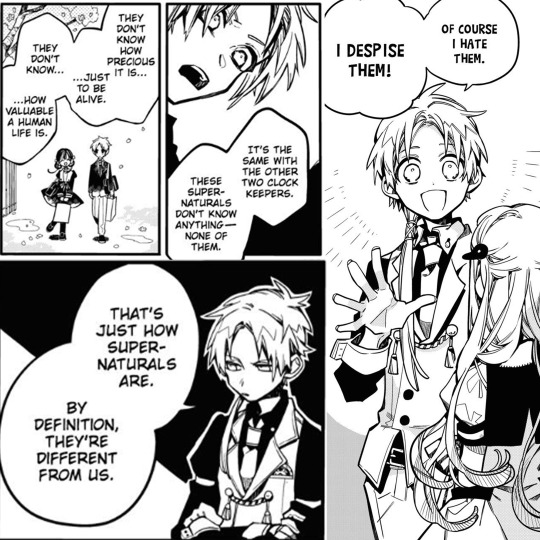
In this new arc, he is forced to face this part of him he doesn't want to acknowledge since the beginning, he has been forced to do it a lot since the grim reaper arc (and I think it's really starting to get to him but this is for another day)
Aoi Akane, the human forced to be a supernatural who hates his contract and the clock keepers so much he wants nothing to do with them. But what does he do when fighting Tsukasa? He keeps the latter's attention on him so the threat can't get to Mirai.
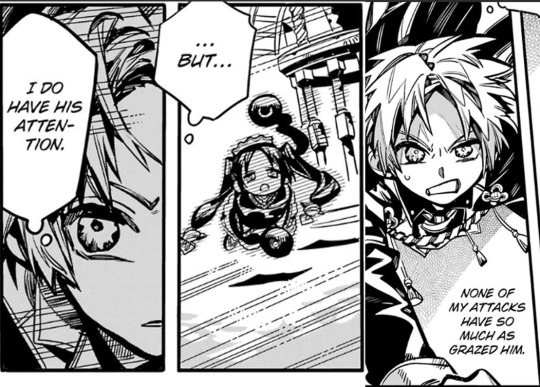
Akane is mortal and human. The only mortal clock keepers and supernatural, and he still risks his life to protect Mirai. The yorishiro of the clock keepers yes, but mostly Mirai.
He shifts his attention from Tsukasa to her because he knows what she represents for the clock keepers and he waits for the moment to let her free, even if it results in him getting hurt.
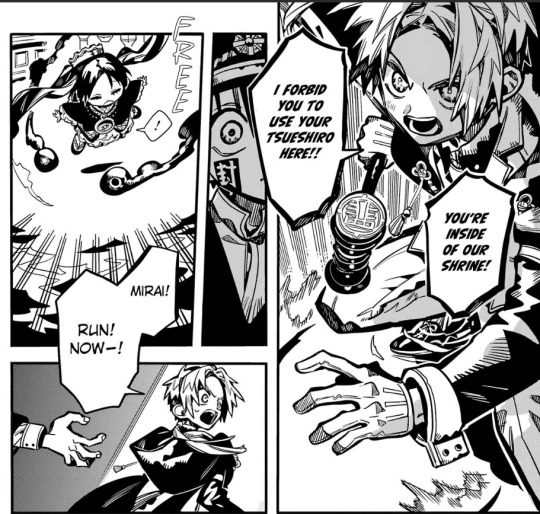
Akane is the character of the cast who shows the most how he loves life, he definitely doesn't want to die. We can see it in how he defends himself, his last movement in this fight being one of protection (and fear). Something he has been doing more since coming back a second time from the far shore. Even if he doesn't want to die, he is still at his core a nice person. He is distressed at the idea of death, disappearing for good, no matter who it may concern in the end. Finding a way to protect Mirai (and the yorishiro) goes before his own safety.
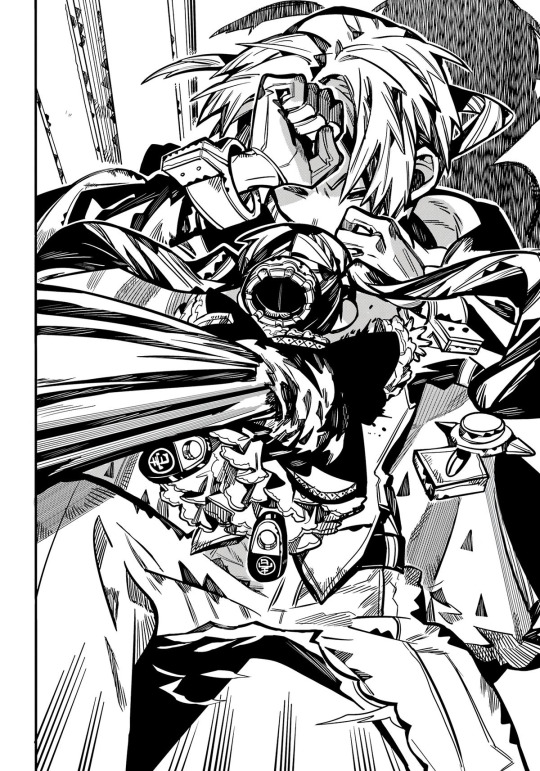
And then Mirai gets the blow for him. She knows it means Tsukasa will get the yorishiro. Kako has been the mystery the most alarmed about the yorishiros being destroyed by Hanako. But Mirai, n°1, who knows how dangerous it is for another yorishiro to be destroyed for the land, sacrifices their seat number, herself and what is supposely the most important thing to them, for Akane.
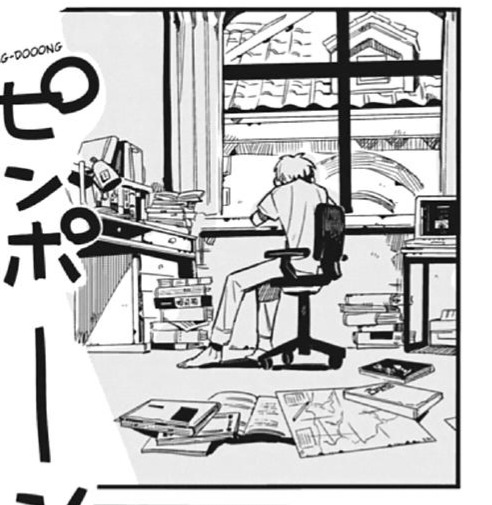
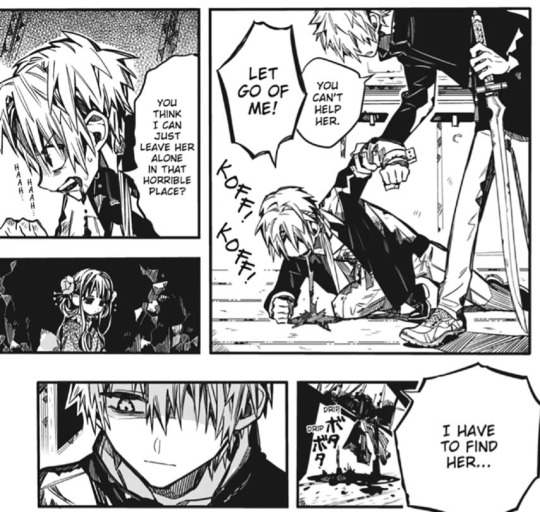
Akane is a proactive character who rarely stops in his actions. Even when Aoi was "dead" he was activaly searching for a way to bring her back and when he learned she was gone he was quick to try to find a way to go where she was. When he stops, it's because he is physically unable to move. But here, even if he is still concsious and has Time's power he doesn't do anything, like he is the one being stopped in time, unable to move on from Mirai's body.
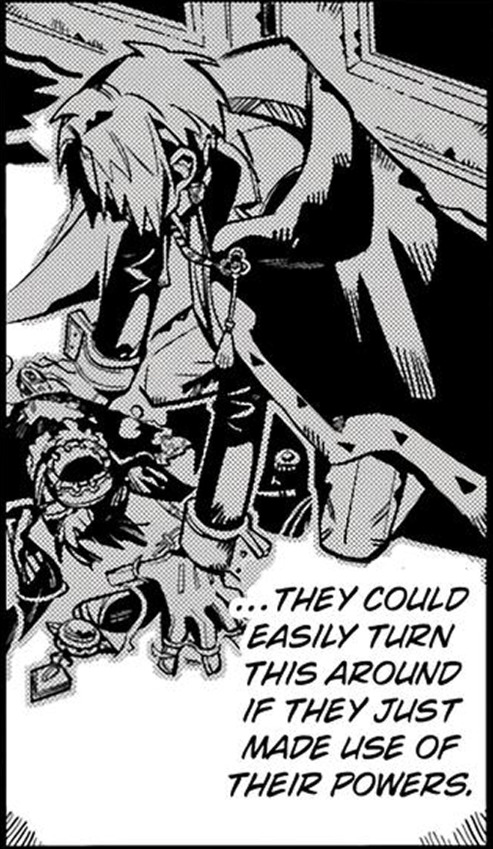
Mirai may be made of gears but it's been clear since the beginning that she has a real attachement to Akane. Wearing the name he gave her like a medal, jumping on him whenever she can, having a personality where she clearly has fun when he is present, and actually being the one noticing him on his first day at school.
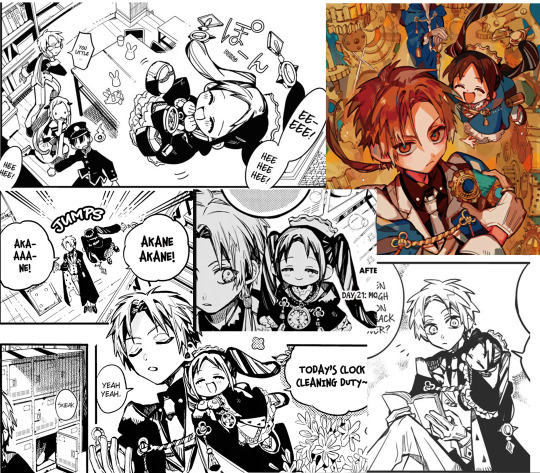
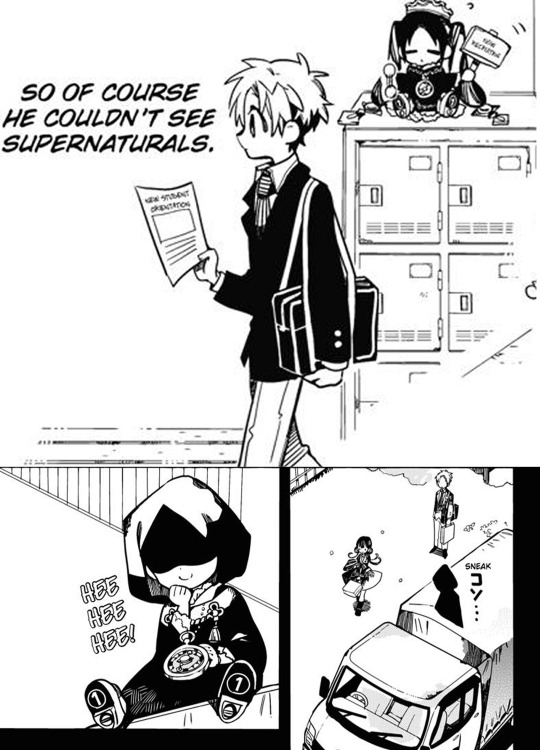
And what does it mean after all for a yorishiro to be sacrified to protect something else? That maybe Akane is in the end more important than what the yorishiro represents for the clock keepers.
If this follows the pattern of a lot of mysteries it may mean that Mirai and Kako have strong regrets/resentment towards the story/person behind their yorishiro.
It's kind of beautiful in the end to see Mirai sacrifiying their past and future to focus on the one representing the present.
#toilet bound hanako kun#mirai#aoi akane#this is just me being delulu and putting tons of images#some glimps on Akane's character there is SO MUCH strange stuff happening with him since he's back from the far shore he doesn't seem ok lo#I won't go into the 'yes but t's strange how much they don't care about the yorishiro'#'it's maybe because it's not the real one'#'Mirai may not be the one noticing him in chap 25' etc#just to focus on what we have for now even if I am wrong because I get to be delulu about them and I think it's great like this#not an analysis or something just my thoughts and some hcs tbh#I am weak for them#the three clock keepers#jibaku shonen hanako kun#jshk#tbhk#tbhk spoilers#jshk 110#tbhk 110#jibaku shounen hanako kun#ramblings#I don't wanna get my hopes too high tbh (I assume next chapter will be the Yugi twins)#but I really hope we will have some answers about his duty and the clock keepers at one point#if it's still relevant and not just something said for nothing before the joke that is chap 109#I wrote this late for reasons too just wanted to post it before chap 111
207 notes
·
View notes
Text
For People, Not for a Dream
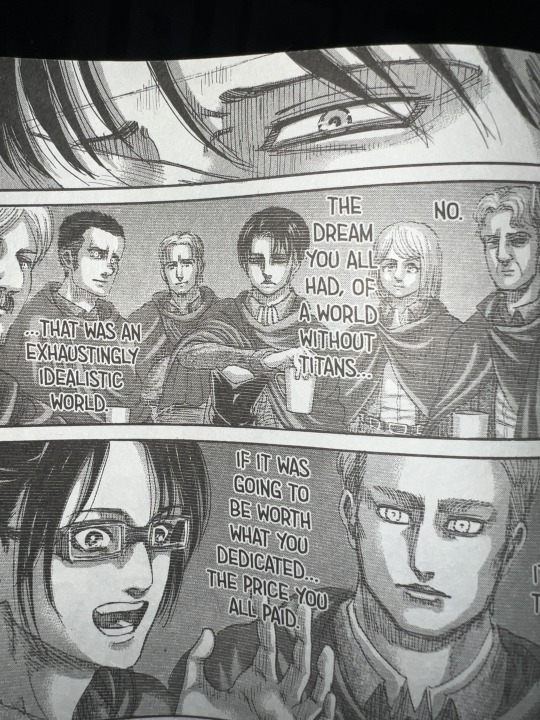
Everyone always wonders about this panel, and why Levi didn't include himself when talking about what all his comrades fought and died for.
The thing is, Levi was never fighting for that ideal world, or to create an ideal world.
For him, it was never about a concept or an ideology, because he never believed in the possibility of an ideal world to begin with.
Even when he gives his monologue to the 104th, during the Uprising arc, and speaks about freedom and the chance to have a world without the threat of titans, he still says that both world's are hell, just that he chooses the hell of people killing each other over the hell of being eaten by titans.
So I think to understand Levi, it's important to understand that he never cared about or was motivated by any system of belief or philosophy. He never did what he did with the goal of creating some Utopian world or society. His actions were never driven by any sort of fanaticism.
He was only ever fighting for people. To help people. Even in their ugliness and with all their faults and failings. He accepted that about people and the world; he accepted their imperfection. He never tried to change anybody, he never labored under any sort of belief that he could weed out the bad elements of society and, as a result, force a better world into existence, or a more civilized society. He wasn't blinded to the ugliness of his own actions by a sense of moral righteousness or belief in the "greater good". He never believed any set of beliefs or principles or ideology was or could be made inherently superior to any other. He never believed people could be made better than what they were. And yet he still found their lives worth protecting, along with their right to choose what to do with those lives, whether it be good or ill.
I think that's a big part of why Levi never loses sight of his own humanity, why he never becomes cruel. Because he never loses sight of what he's actually fighting for. Not an idea or a set of beliefs or a dogma. But just people, even when they're not good people.
And we see that reflected in Levi's lack of any sort of dream for himself, and in his support of other people's dreams. He's not fighting for their dreams because he believes in them or their possibility, he's fighting for their dreams because he believes in the worth of the people who dream them. It's the people who have worth to Levi, not the dream or the ideology behind the dream. And he hoped to prove that worth by ensuring they didn't throw their lives away for nothing. That's why he lent his strength to those dreams. It was always for the dreamers sake, not the sake of the dream itself. To show their lives mattered by helping to realize whatever it was they gave those lives for. It's why he's so determined to kill Zeke, because those soldiers in Shinganshina gave their lives for that goal. It wasn't Zeke's death that mattered, but the lives of the soldiers that died for it.
It's why he says in the above panels that if it was going to be worth the price "you all paid", it would have to be an "exhaustingly idealistic world". Nothing less than that would be worth people's lives. I think it's also why Levi's expression is one of such sadness all through the final chapters, because he knows, and always knew deep down, that that idealistic world was an impossibility. That even without titans, the world would still be a hellish place, something we see proven by the final pages of the story, with the destruction of Paradis and the continuation of war. In the end, I don't think Levi believed the outcome was worth the price his comrades paid. It wasn't worth their lives. To Levi, the concept of a "greater good" isn't worth more than any, single life.
But it's also important to remember that Levi was never the type of person to tell anyone else what to do, or what to think, or how to live, and that in itself is testament to how much he values people. The worth he sees in their lives and existence is reflected in the respect he holds for their right to choose what to do with those lives, even if that choice is to give their lives for an impossible dream.
And so that's what he fights for. Not for any sort of dream, or for the realization of an ideal world, but to help people. To help them in whatever way he can, whether that's saving their lives, protecting their right to choose how to live those lives, or supporting the dreams they believe are worth giving their lives for.
It was never for the dream itself. It was for the people who dreamed it.
156 notes
·
View notes
Text
Something I've noticed throughout this season of Hazbin is how Alastor is personally working against the Hotel's goals.
We see in "Radio Killed the Video Star" that Al is petty and holds himself higher than all of hell. Alastor can't stand being viewed as the inferior entertainment, so he completely shuts Vox down. Although they are preestablished rivals, Al is outright against any sort of change. He mentions that Vox wanted Al to join his team, but Al can't imagine viewing someone as his superior or equal.

When Lucifer visits the Hotel to help Charlie, Alastor assumes that she wants her father to replace him. Instantly he goes into defense. Al fights like he isn't afraid of death while arguing with the king of hell himself. Naturally, the element of Pride cannot back down from a fight as they constantly one-up each other.
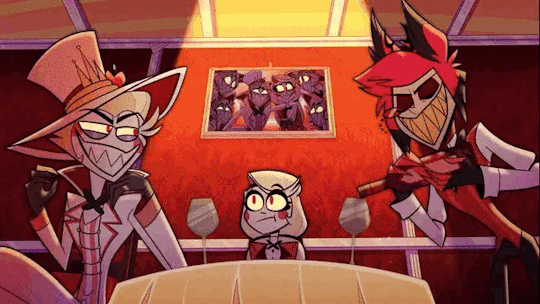
Notice how this arc is opposite to Angel's or Sir Pencious's?
Our other two sinners are learning how to trust one another and accept themselves. Angel learns how to open up about his trauma with Husk and begins to understand why the Hotel is so important.
As opposed to Alastor who refuses to accept change, look into himself, or go out of his way to help somebody else.
When Mimsy appears, he is happy to see her and quickly ends her battle. However, when he realizes that she is of no use to him, he instantly sends her away.
Or when Charlie is having a meltdown, and he explains how a smile is the best way to stay in control? He is completely unable to view this situation from her perspective.

With all this, I think that Alastor is going to have the most interesting character arc in the show, as he learns to accept love.

as always these are just some thoughts, and i am more than happy to hear everyone’s takes 💕💕
#hazbin alastor#hazbin#hazbin hotel#alastor#alastor the radio demon#hazbin theory#hazbin hotel theory#hazbin spoilers#pleas dgmw i love alastor#he is such a creative character#i cant wait to see him in season 2
180 notes
·
View notes
Note
Favorite rewritten scene from TPB? Any scenes you think would fuck if they were animated? Dont worry why im asking its not important <3
Hmmmm....
Well, BB!TPB is probably the least changed arc to begin with! Better Bones is a project that is basically trying to deliver on the themes I liked in the first 5 books; a flawed society is on the verge of birthing a great monster, a reckoning generations in the making, which can only be saved by the very outcasts their culture seeks to destroy.
So I'm not adding too much to it which isn't just building up the culture some more, adding personality to some background characters (especially mollies), or shoring up cats in ShadowClan.
I've got an old post floating around somewhere about my goals and a basic summary for each book, but here's a MASSIVE ramble about things I plan to add
The three MAJOR cool scenes in here though?
Rusty's Collar
Deerfoot's Sabotauge
Scourge's Collar
Into the Wild: Opening stuff, ThunderClan expansions, Rusty's Collar
For one, DAPPLETAIL has a much bigger role as Firepaw's first teacher. Rusty speaks Townmew; he needs to learn Clanmew.
So I might make the meeting with Graypaw earlier, or just have a bit more of a transitional period where he's "living with a paw in both worlds" before he gets named Firepaw
He also is able to see and take part in some of the Expanded Roles, while still learning Clanmew.
Frostfur is Head of Kitchen Patrol, pregnant, and overworked. Rusty likes her though, he can't always tell what she's saying but he learns she calls him the "Intense Gingerthing (affectionate)" and she's got cool scars
Tigerclaw might be Head of Hunting, or his cousin Willowpelt. Undecided yet; Willowpelt will be taking over after he becomes deputy though.
I forgor who is Construction Head at the moment, probably Mousefur. In any case it's a molly, One-eye has been retired for a long while.
Dappletail is the Educator, naturally, and she hangs out with Ravenpaw and her son Graypaw. Ravenpaw has a habit of telling tall tales.
The adult he's closest to though? Spottedleaf, the Cleric, like a big sister.
IMPORTANT: Rusty's time as a not-apprentice comes to a hard end with his battle against Longtail. Probably because he now understands enough Clanmew to know he's talking shit.
This time though, we're setting up some foreshadowing lads
Unlike other depictions of the collar removal where it's framed like the triumphant moment he enters the Clans, with a beam of sunlight revealing to Bluestar that he is the cat of great prophecy, his collar being snapped off comes with trembling fury and anxiety
He was terrified and angry in that moment! He's been bullied by Longtail, it just came to physical blows, and he was being choked by his collar digging into his throat so he couldn't breathe. When it suddenly SNAPS, he's hacking and coughing, but the whole Clan is cheering at the spectacle, it's like...
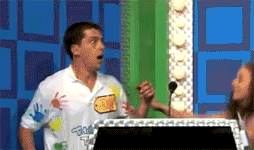
He's being told he's just proved himself. The joy of finally getting what he's really wanted, of landing a mark on his bully and being CELEBRATED for it, it starts to wash away the fear and fury.
It's sudden, like whiplash. He's trembling, he's growling, he's smiling. His stomach is rolling and he doesn't know which emotion is turning it.
Then, his collar is buried. He only sees it out of the corner of his eye, Dappletail (someone he likes) digging a little hole and dropping it in. Like getting rid of something dirty. He can't identify the emotion that prickles his heart in that moment, and to his dying day he never learns the word for it.
But it's going to be the same thing he feels, much much later, after the roar of the BloodClan battle has gone quiet and he's staring at the collar he ripped off Scourge. He spared the leader's life and caused the group to retreat... but, looking at that collar, so lovingly studded with trophies not unlike the ivory Clan cats take from boar hunts...
He realizes that it's meaningful. To Scourge. He can't go far enough to admit that his own collar meant something to him... but...
it would be wrong to just discard this. This emotion drives him to eventually approach Scourge and BloodClan again, in the Epilogue, returning the collar as a gift of goodwill and re-opening discussion about Tigerstar's Impossible Deal. These talks open up a new era of peace and trading between Chelford and the White Hart, until TNP brings it to a tragic end.
But anyway!
Ally Expansions + Deerfoot's Sabotage
In an effort to establish that the Clans have unique subcultures, and that the cats within them are unique individuals, BB!TPB needs more positive supporting cast in more than just WindClan.
GATHERINGS NOW HAVE AFTERGATHERINGS. This is like a discreet afterparty, which adult warriors can choose to attend by simply staying behind when their leadership returns home.
Fireheart regularly attends them until the moment he becomes leader.
A few of his friends in other Clans are Aftergathering regulars. Onewhisker, Mosspelt, Wetfoot.
Some others are just occasional visitors. Mistyfoot is brought along by her sis-in-law, Mosspelt, once or twice. Morningflower comes to do some trades.
(at his FIRST aftergathering he gets to meet Carpwhisker and Cinderfur. These two are noted to stop coming when the political tides harden.)
Because this is the Thistle Era, the Aftergathering is much smaller than it will be in a few generations.
They're also still careful to not leak too much information outside of their own Clans, and the ShadowClan cats are even particularly excited at Fireheart's first Aftergathering because it was difficult to regularly attend these while Brokenstar was leader.
DEERFOOT is a MUCH expanded character. Son of Lizardstripe, brother of Runningnose and Tangleburr, Deerfoot is involved in opposing both Brokenstar, and later NIGHTSTAR when he feels he's going against what Deerfoot fought so hard for.
And, most famously and most fatally, he's the head of the TigerClan Rebels.
Much as I like Ravenpaw... he's not getting his cameo at Stonefur's execution. No, I'm not going to be having the HalfClan cats rescued by Graystripe's bad feeling and also Ravenpaw is there. Freeing the prisoners was an action that came from WITHIN TigerClan.
Deerfoot is going to be beseeching Firestar for it. I haven't figured out EXACTLY how yet, but I'm thinking that it's after Darkstripe was exiled (suddenly, Tigerstar no longer has a mole in ThunderClan) and he's able to ask for Firestar's help openly and honestly, and tell him how many cats will need refuge if the plan is successful.
Being leader now, and not JUST a deputy, Firestar has to consider the way it might drag his Clan into conflict with a huge opponent... which Deerfoot assures won't happen, because his forces have a process. Using ochre and onion, they obscure themselves completely. Not a single one's been caught-- besides the ones who were picked up for the "crime" of being HalfClan.
Deerfoot is going to be killed for what he does here, saving so many lives. So he won't pay for the little trick he's going to pull.
While applying Firestar's ochre and onion, just before entering the camp to rescue the HalfClan cats (and finding they've started an execution early-- with Stonefur), Deerfoot draws back to look at his handiwork. Not a single fleck of his bright, unmistakable orange fur is peaking through his disguise.
So he clicks his tongue, "I've missed a spot." With a rub of his paw, the ochre around the ThunderClan leader's eyes is smudged. Just enough that anyone locking with those green eyes would see the fire poking out from beneath.
Later, when Firestar learns of this after Deerfoot's death... he chuckles with equal parts bitterness and admiration. Most of Deerfoot's Rebels had to go right back to living in TigerClan, and knowing Firestar was leading the battle patrol would take suspicion off them... but, knowing his old, lost ally... a bigger part of it was that Deerfoot was hoping that information would reach Tigerstar and BURN into him.
Compassionate and spiteful to the last, that Deerfoot.
Darkest Hour: BloodClan and Scourge's Collar
I think if I was going to rename the individual books, I'd call the last book of BB!TPB "The Moment of Truth."
BloodClan is keeping the way that it's not important until the last book. Aside from an offhanded mention here and there and a run-in with some peons that replace the rats that attack Bluestar, they're not relevant until the moment they're introduced.
I do want to keep how SURPRISING it was to see them suddenly roll up, keep that feeling that they're brutal, unsettling, foreign. When Tigerstar loses his shit on Scourge for not following his order and attempts to kill him, I want to keep how cold, sudden, and BRUTAL that ending was.
But... when Scourge FIRST appears on screen, he looks much different from the Iceheart he will eventually become. He begins to look less "monstrous" and more like a PERSON as Firestar realizes that they're not so different.
Scourge has no pupils at first. His eyes are solid, icy blue.
He also has no mouth when he isn't about to bite, no lip synch when he talks. Like he's just existing ominously onscreen, wind ruffling his spiky, ungroomed fur.
Before the killing of Tigerstar, it's noted that Scourge's speech is odd, and hard to understand. But, you can sort of make out his intent if you listen carefully.
Firestar recognizes that he is speaking Townmew, his own first language.
Tigerstar doesn't really respect him enough to listen, until he barks an order and Scourge tells him, "...My cats move when I command them, and not before."
Like canon, Firestar steps forward to speak with Scourge. Unlike canon, he very intentionally begins speaking Townmew.
ALSO like canon, when Firestar explains Tigerstar's crimes, that he will never honor any bargains he has made, and thus that they can't be trusted, he rolls that Nat20 and Scourge tells him that there will be no battle today as he thinks about this new information.
And, of course, Tigerstar lost his marbles about this. And also his organs
And Scourge is SEETHING. That's his LAST straw. He made a deal and he is NOT being given what he is owed, he tried to gracefully walk away only for Tigerstar to disrespect him for the last time, and he's SICK. AND. TIRED. Of backstabbing, DISHONORABLE CLAN CATS.
And YET. He remains cool. And he tells Firestar directly, "In light of this, I have changed my mind. We will be taking what we are owed. You have three days to leave, or it will come to combat."
Another big change from canon is that no Clan needs to be convinced to fight. It's a battle culture. They were ALWAYS going to win, or die in glorious combat. Running away is not an option in this era-- they believe their eternal reward is up in StarClan.
But Firestar CAN unite them, bring them together to discuss battle plans. And in this first day...
TigerClan is dismantled. Though Leopardstar tries to cling to her newfound leadership of TigerClan; both Shadow and River are clearly tense and demoralized. Anxious and snappish warriors are mulling about the camp.
and STILL, Firestar is dealing with a bunch of cats who are openly disrespecting him.
Even when he reminds them, "YOU brought him to the Forest! Tigerstar's deal was HALF our land and I could pull LionClan out at any time! I'm trying to HELP YOU"
Darkstripe in particular is still here with his little xenophobic jabs. And he is Xenophobic Jabbering.
In spite of the guilt Leopardstar feels, and the resentment that Blackfoot is starting to feel for Tigerstar and the position he's being thrust into, they're still DIFFICULT, not giving Firestar clear answers about if they're going to come talk battle strategies or not.
Firestar can't believe this.
They're really gonna do this. Say that TigerClan can take care of its own problems.
They're just gonna try and hold onto their scraps of pride and charge into battle, NO plan, because they think they're above him.
After ALL OF THIS, EVERYTHING thats happened, the times they've fought and he's won, becoming deputy, even earning the authority of a leader...
They're STILL not taking him seriously.
This prompts Firestar to end up losing it, the "I saw what you did to Stonefur" speech to Blackstar is moved here, addressed to BOTH of them.
But this time, there's even MORE victims. He lists ALL of them, plus the refugees still in his camp.
And they're gonna kill even MORE cats? What? To be the smuggest corpses in the GROUND?
OR MAYBE THE HAPPIEST LITTLE SKULLS ON THEIR STUPID HILL.
It SHUTS them up.
Leopardstar, in particular, clearly haunted by this... her own father, Mudfur, is one of those refugees. And she is staring intently at some of the bones on the hill.
Unfortunately, her remorse will not stick. Distance will make Blackstar more ashamed, but Leopardstar begins to look back with nostalgia.
But FOR NOW? It MATTERS.
Darkstripe comes in with another little comment, and she snaps at him.
Then she turns back on the Bonehill, and says the, "This belongs to a darker time" line.
Firestar also ends up visiting with Barley Sr, Jr, and Ravenpaw. Chatting about reasons why Ravenpaw still doesn't want to come back, even though Tigerstar is gone.
And about BloodClan, as Barley Senior comes from there. Bone is his mother (though due to some timeline things I'm considering her being his sister; and then Hoot and Jumper are littermates OR cousins of Junior.)
Ends up explaining a bit about the history, how it was formed because of Oakstar, the context of the descendant of Oakstar turning on Scourge like that
Plus why Barley Sr left. His time as a solver, the death of Violet Sr, the way BloodClan demands tribute to keep its cats fed.
And while BloodClan has issues... Firestar is realizing... so do the Clans.
Violence, blood feuds, war... xenophobia. He's still seething over that exchange from earlier.
Firestar's anxious over the big fight, and the people he knows he will lose. GOOD people. The battle won't discern the crackerjacks from the jackasses; people he loves will die. He HAS to win. And yet, his feelings towards Scourge feel frustratingly conflicted.
On the second day...
Finally he's getting somewhere with the other four Clans. Everyone's preparing properly, learning how to fight TOGETHER and not just as four separate entities.
But in ShadowClan, he catches POISONS. Runningnose and Blackfoot are planning to go into battle using the same tactics they used against WindClan-- things that won't kill right away, but will cause inevitable infection and kill slowly, and painfully.
And they're showing OTHERS about it, too.
And this UPSETS Firestar
But, AGAIN, he's able to talk to them. They have a point-- if BloodClan is going to use those claw-weapons, they ALSO have an unfair advantage.
Firestar, about to invent Rules of Engagement: "If they weren't going to use them though?"
That's how Firestar ended up in a british back alley. Meeting with BloodClan.
Scourge is cold and polite, as always, makes a comment about him being early.
Firestar tells him about the poisons, how he's seen them be used before, and how they will kill slowly,
Scourge is torn... at first, thinking it might be a lie, but then the shock of what might happen sets in. He asks, "and why would you warn us about this?"
"Because it's the right thing to do. We're fighting for our home and you're fighting for your promise; It should be a fair fight."
"which means you're reigning them in, then?"
Nods, "If you use the claw extenders, they're going to use an unfair advantage of their own"
As they dig deeper into the conversation, Scourge loses his patience.
"Enough. I've heard enough lies from Clan cats, forest fool. You untrustworthy lot NEVER uphold your end of the bargain, you come here to weaken us but we will not be tricked by a dishonorable foe ever again."
It's starting to hit Firestar now. Scourge... is kinda right.
He's RIGHT to be so distrustful of Clan cats. To think they're dishonorable. He's seen them all himself; liars, hypocrites, cowards, all of them allowing EVIL things to be done to innocent cats.
The pause seems to last days, but it's clear to Scourge he's thinking deeply about what he said.
When Firestar looks up he tells him, "I understand. But I am honorable."
Scourge laughs at that. The whole alley does.
But he stands firm. He will uphold HIS end. "And when you come tomorrow, you will see that I've held my people to it."
"Then you're a greater fool than I thought, weakening yourself."
"Tigerstar believed that honor made us weak," he says with defiance, "and you killed him. I buried him. Now he is dead; don't choose to keep his memory alive."
AND ON THE THIRD AND LAST DAY
When they all come to face off at Fourtrees, it is seen, most of BloodClan is not wearing their extenders.
And most of the Clan cats do not have deathberry-red claws.
There are just some. On both sides.
Scourge is not one of them. His claws are his own
Fire and Scourge step foward in the center, their armies behind them.
Scourge quietly points out the irony in a hushed tone, for what he is about to say could have offended either army;
"Two fools, alike in their dignity. Perhaps in another time we would have been Brothers-in-Honor, you and I."
Brother-in-Honor = Townmew term for someone who unites you through a shared, noble cause.
But Firestar is done. He had to say goodbye to many of his cats this morning, he doesn't know who will live and who will die. The Warriors stand behind him, proud and noble, but terrified to their core. He knows this.
This is their HOME. And he is the holy leader of ThunderClan, bearing the fragment of a star within him.
He's lost his patience, and his sympathy. When he responds, it's loud enough for both armies to hear.
(Note: Ever so slightly performative)
"Last chance, Scourge! One step further, and you'll meet the full might of the Warrior Clans."
"Two fools," the little cat laments, "One far more foolish than the other!"
He screeches for BloodClan to attack, and like canon, Firestar loses track of Scourge in the torrent of angry cats
Battle otherwise goes very similar to canon. Out of left field, Darkstripe turns on Firestar with deathberry-red claws, furious and embarassed that he took Tigerstar away and prevented them all from fighting with "every advantage"
Graystripe. One-Man Firestar Defense Squad, body checks him and kills him, trembling in disbelief and immediate regret over his brother's body
Whitestorm loses his fight with Bone and falls, bleeding, to the ground
As he dies, he tells Firestar to let go of his grudges. He was wronged, he was hurt, but please don't let that stop him from making the right choice. Longtail should be deputy.
Firestar announces Longtail is his deputy right there.
The apprentices dogpile Bone in revenge, though I also wouldn't mind changing it. In any case, Bone's dead before Willowpelt can even realize her mate is gone
When he finally sees Scourge again, they grapple ferociously until the little cat breaks loose
Trying to avoid the grallocking move that ended Tigerstar in a blow and not knowing Scourge can't do that without his claw extenders, he pulls back and leaves himself wide open for a vicious transverse slash
He's split open from neck to arm, he can feel himself bleeding out
Scourge looks at him with pity but says nothing, flicking his claws like he's wicking the blood from a sword.
Game_Over.png
Firestar's vision fades into flashing stars and bursts into the silver-and-blue lights of StarClan
He sees the faces of everyone who he's lost, everyone he couldn't save. Spottedleaf who died in a raid. Stonefur whose execution came too soon. Pikepaw who refused to take refuge with his mother. That old bastard Deerfoot. Whitestorm whose blood is replaced with fresh stars.
Yellowfang comes forward, threading constellations like stitches through his gash, snipping at him to stop wriggling like a worm. Spottedleaf is also helping in a way he doesn't understand, licking his fur the wrong way and returning his lost blood like a Mi returns warmth to a cold kitten.
He smiles, filled with the wonderful sensation of a Sharing of Stars, until it hits him again that he needs to go back
Hmm.. maybe ill have it so Whitestorm had no last words and he gives them here. "Don't let the grudges of the past ruin the future. Make the choices you know are right."
Bring the theme together; he was talking about Longtail, but Firestar interprets it differently.
And when he wakes up in his body, gash aching but skillfully closed by the best healers he ever knew, he feels like they filled his veins with a lion's blood.
He grins, a mixture of humor and righteous fury. He didn't know Scourge's tricks, but he doesn't know HIS either.
Scourge has his back turned, focused on Onewhisker who's cowering in front of him. Firestar bowls into him, catching him off guard
"You! You died! I killed you!"
"I played dead."
With a second bolt of strength, Scourge tries to turn it around and they tumble, hissing and spitting, but the little cat doesn't get a second chance
He's pinned like prey, one paw holding his head and the other pulling down his shoulder, growling like an animal with its neck exposed for a brutal killing bite
Firestar lunges down and Scourge screeches, a horrible crack of teeth on bone quiets the battlefield
And then a SNAP
The sun glimmers on the bloodstained collar's fangs, one of the teeth cracked by Firestar's jaws, as he throws it behind him
Scourge's face is truly apparent to Firestar for the first time, his icy eyes wide with astonishment
Firestar recites the beautiful words that had once been made hollow by hypocrisy, "A true warrior does NOT need kill to win their battles," but he presses his paw into Scourge's pulse as a warning, "DO they?!"
He lifts his paw, and Scourge calls for BloodClan to retreat
Though the warriors are shocked at first, they saw his collar ripped off and his black fur soaked in his own blood, and understood they were losing
Just as united as any Forest Four following the command of a leader, each warrior disentangled as quickly as possible and streamed out behind their bolting leader
Some warriors ran after them to chase them out, and came back a few minutes later
And just like that, it was over. They were gone.
But, that collar is laying there, in the light of the setting sun. The inner fabric is purple, covered in a layer of red and brown from a mix of fresh and dry blood. Various teeth poke through, which he now realizes are from various predators.
Firestar gazes at it and feels Rusty's heart beating. He has that strange, indescribable feeling again.
It's... just like Clan cat hunting trophies, yes. It's a valuable, meaningful object to Scourge. It's a spoil of war made of spoils of war. That's why it's stirring his chest, surely. There's something... deeper to this item. It shouldn't be discarded; this item needs to be kept safe.
Or, perhaps, returned.
From there, the epilogue is gravy. When Firestar arrives in the alley again, this time flanked by several cats, Scourge is still recovering from his many injuries. He feels like he's been seeing Firestar's face too often-- and then the collar is gently placed on the ground.
Just like Firestar expected, there's an energy that washes over the gathered cats, and even the unreadable Scourge now seems awestruck by the gesture. The collar was something greater than just a collar; though Firestar couldn't remember if he had ever been told what a BloodClan collar represented.
Speaking, again, in Townmew, he explains that Tigerstar made Scourge an Impossible Deal, which the treacherous tyrant never meant to honor in the first place. But he is dead. BloodClan cannot have the territory and the Clan cats have won it fairly-- but what CAN we do for you? What were you seeking?
The answer was so simple that it was almost sickening. That they'd come to blows, and cats had died, over something that could have been worked out so easily. BloodClan had plenty of food from the humans' excess and hunting in the wilderness was not a skill they ever had anyway. What they wanted was materials.
Wood. Flowers and herbs. A chance to walk along the hiking trail and see the giant trees. Maybe the occasional piece of prey they didn't have access to in the town, like squirrels and frogs.
So, for a while. There was peace in the Forest, bringing the Tiger Era to a definitive close and beginning the fruitful, but short-lived Fire Era.
So! Them's the major changes. Take your pick of the scene you think is coolest, personally I've got a thing for Firestar ripping off Scourge's collar.
#BB!TPB#Better Bones AU#BB!Firestar#BB!Iceheart#BB!Scourge#Minor edit: Got possessed with more dialogue for the scourge confrontation scene
218 notes
·
View notes